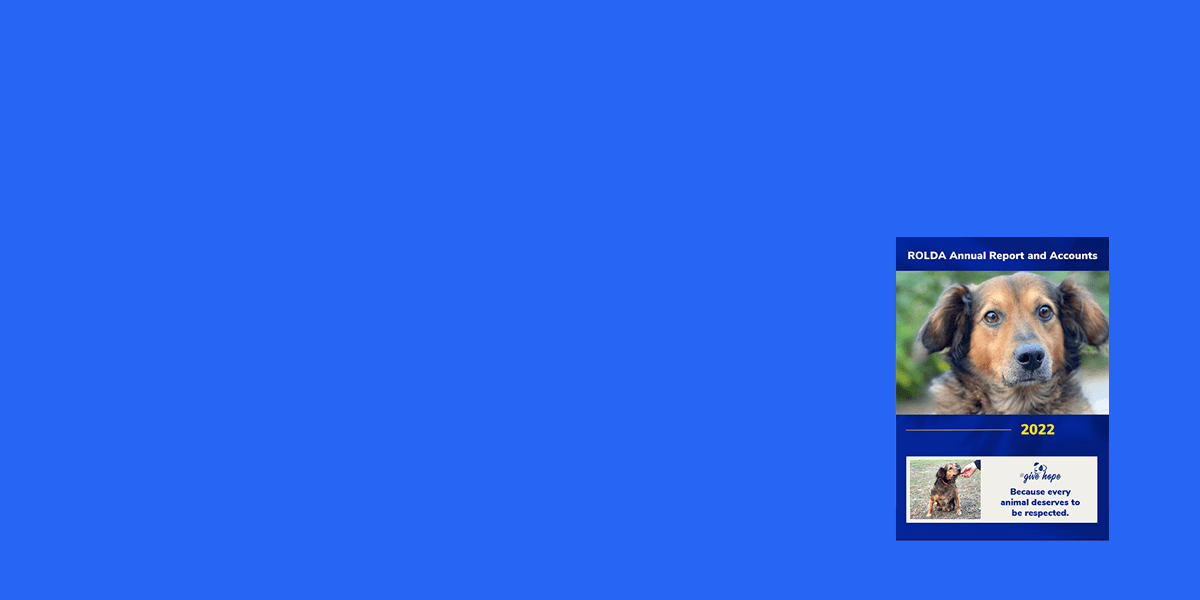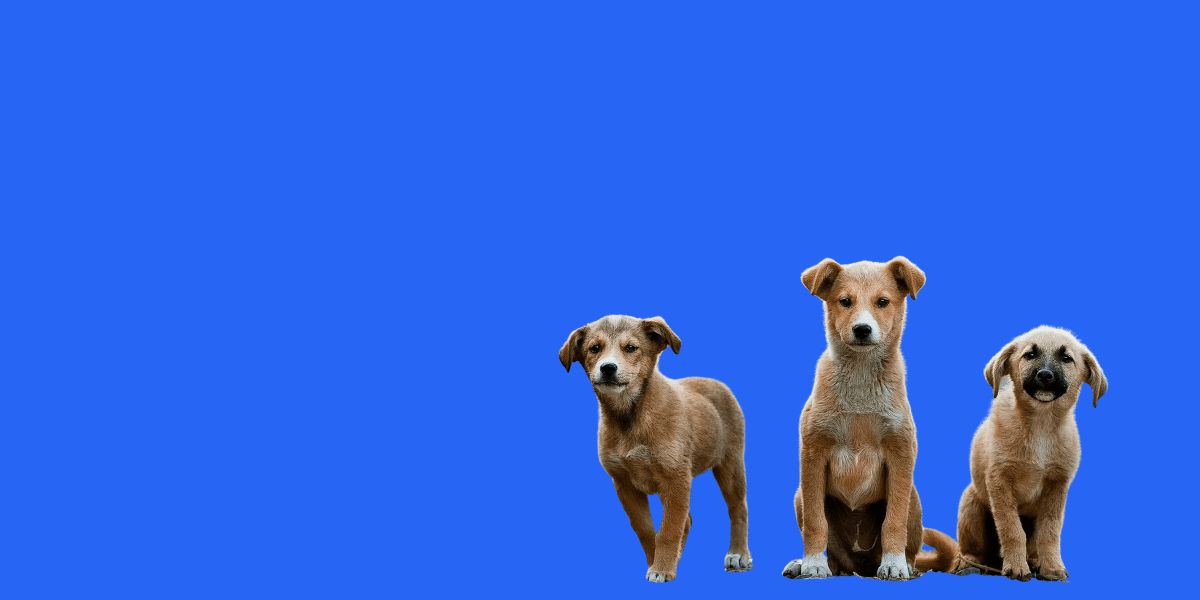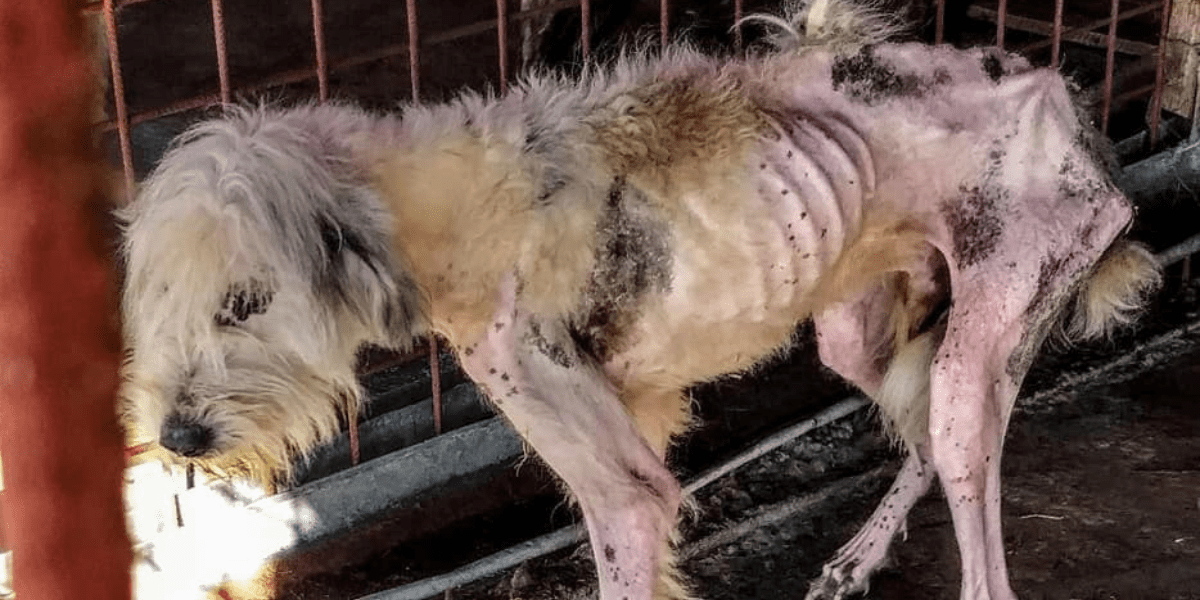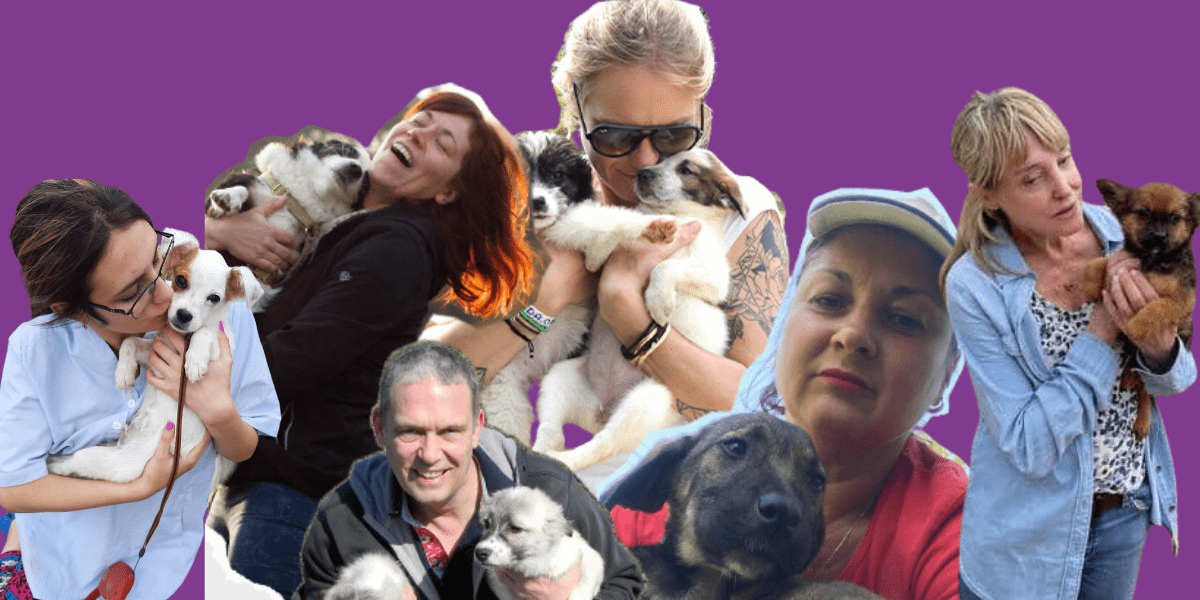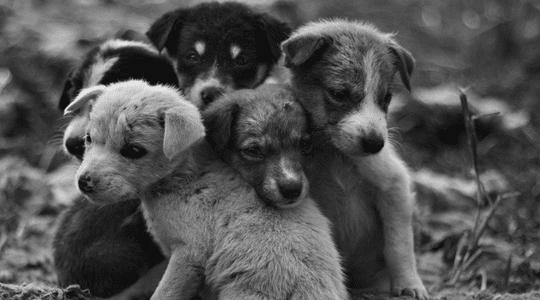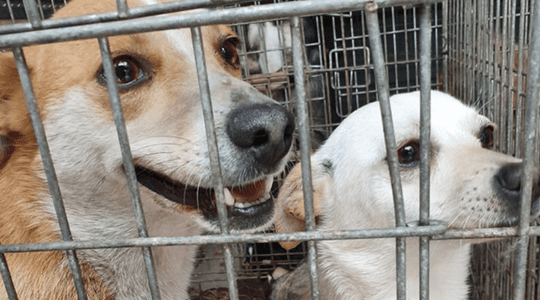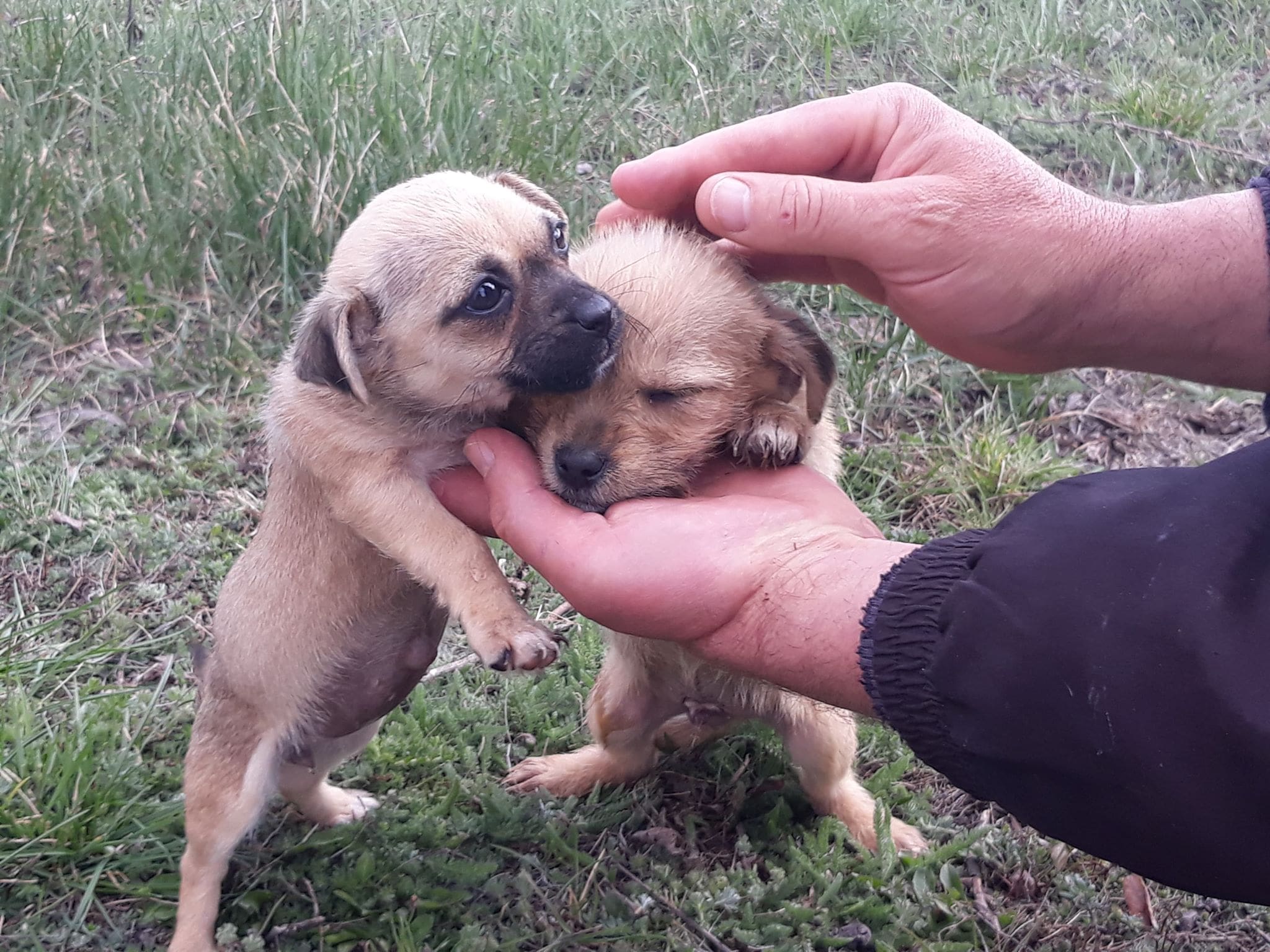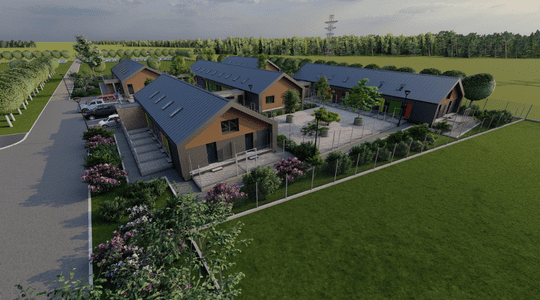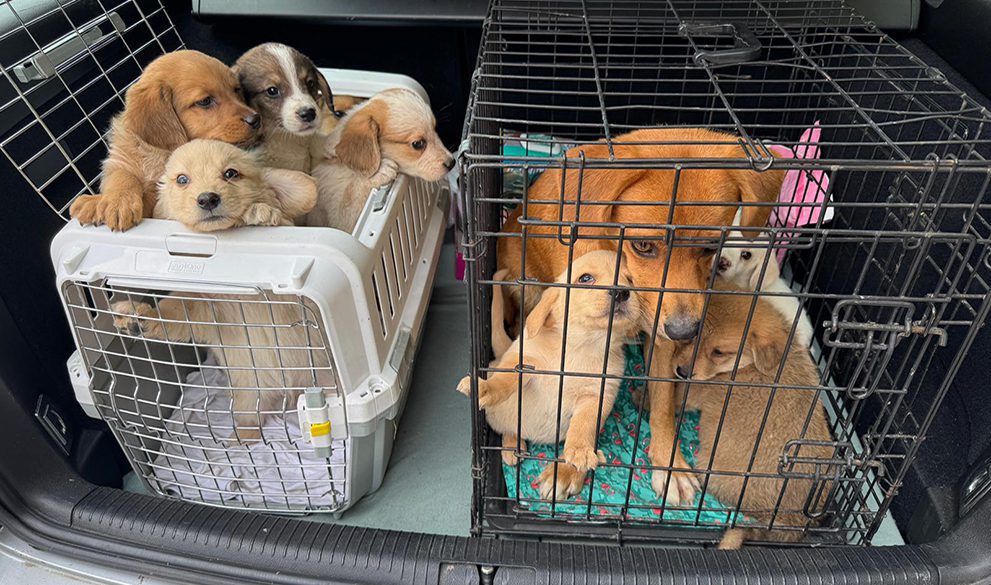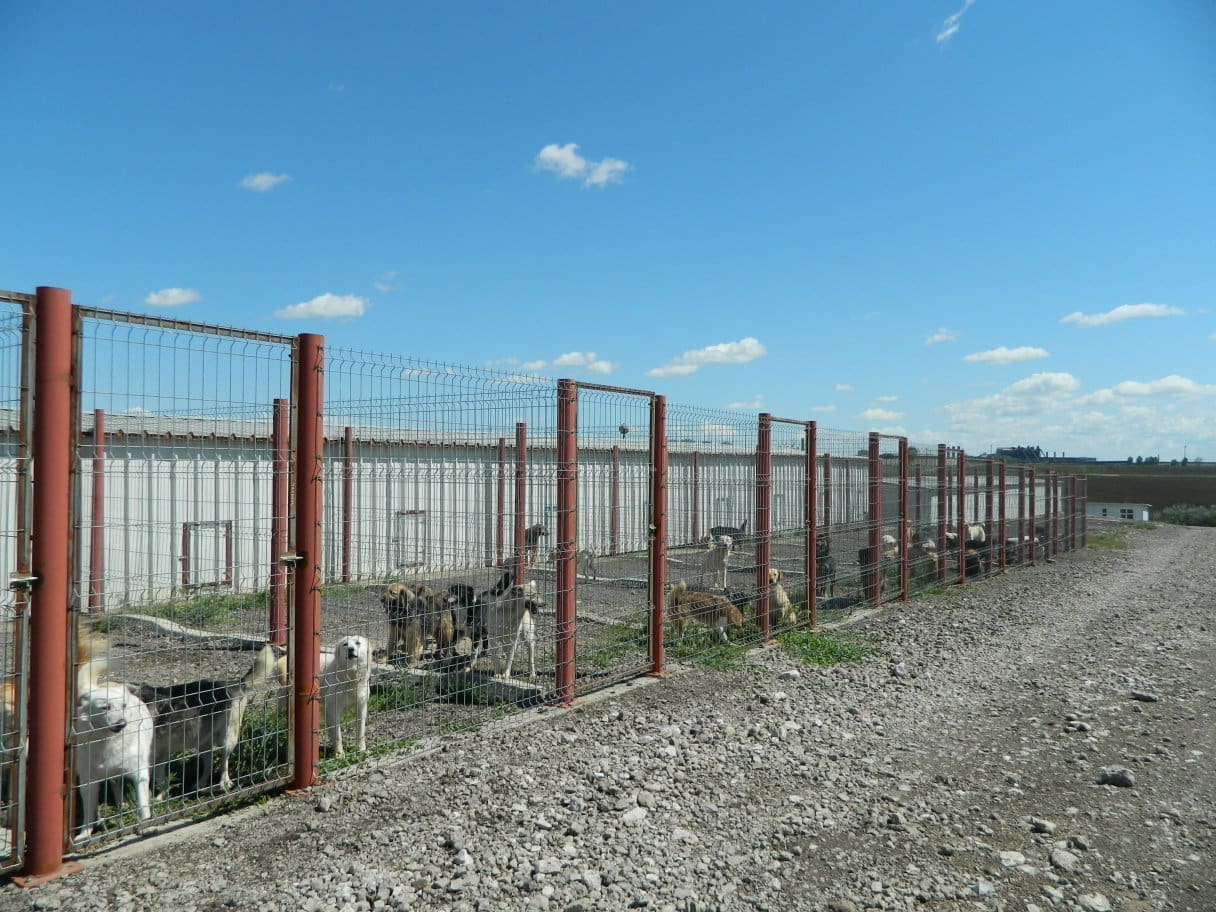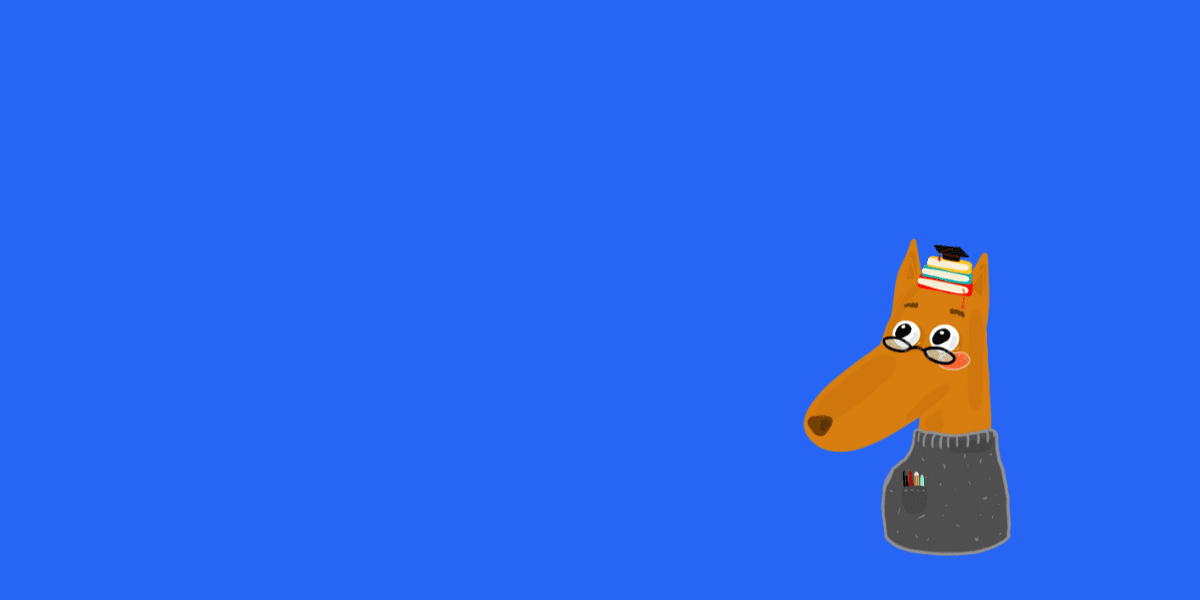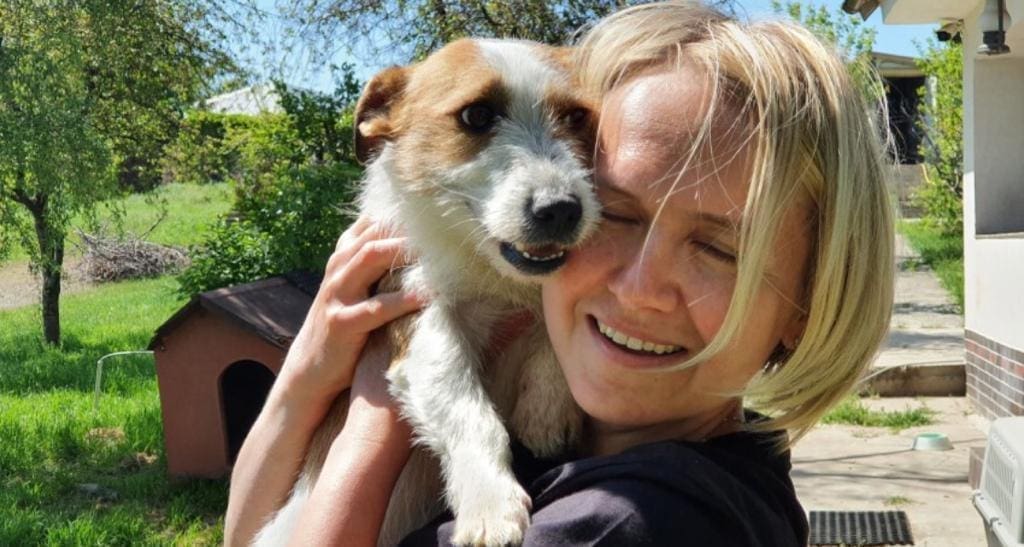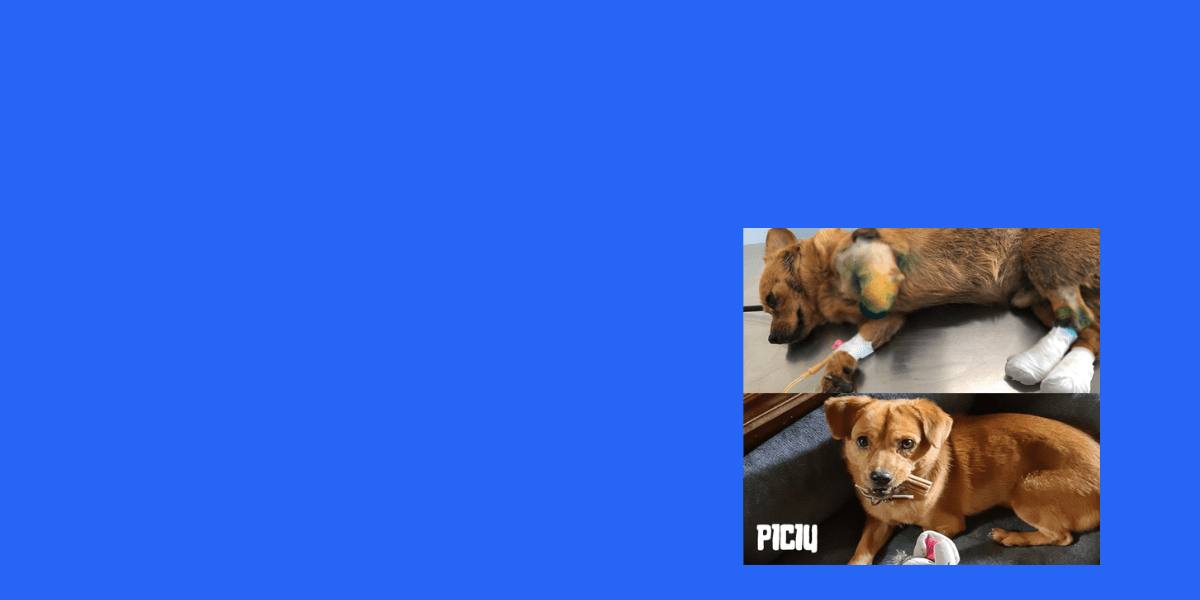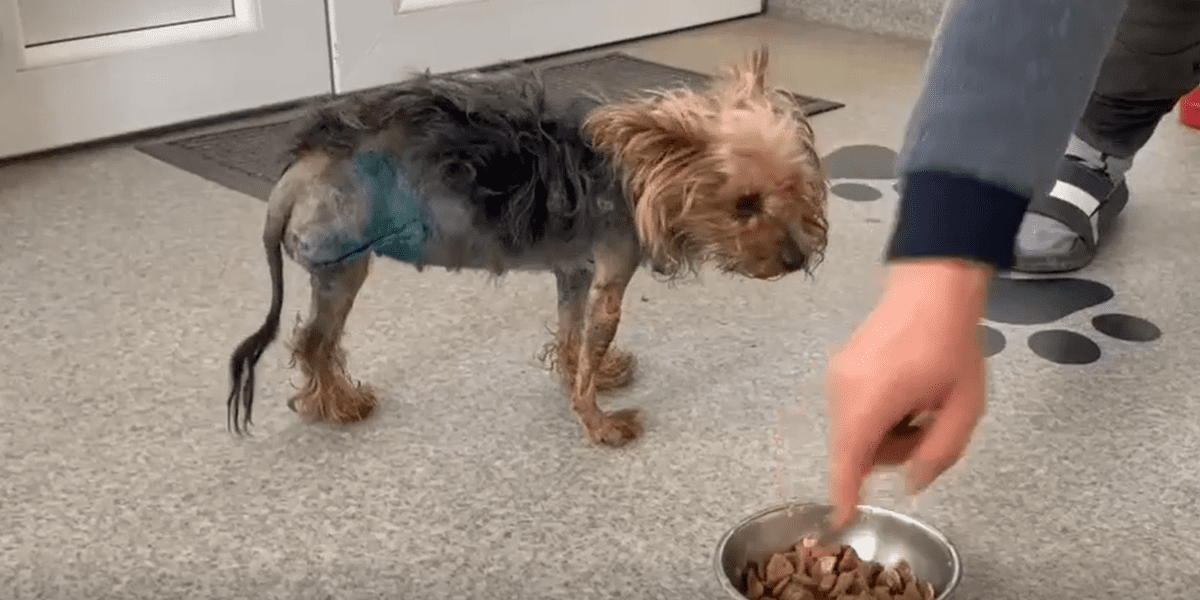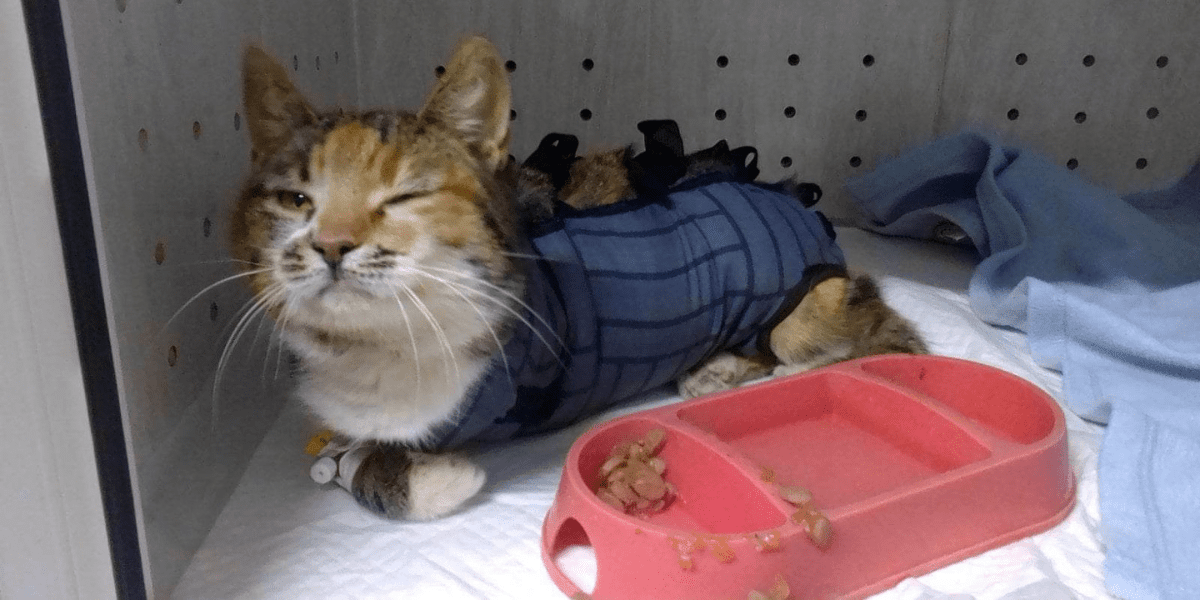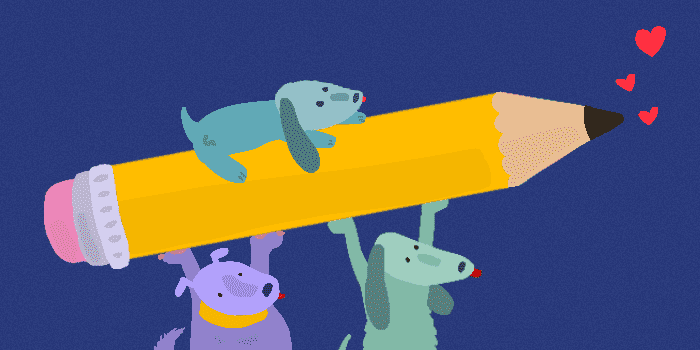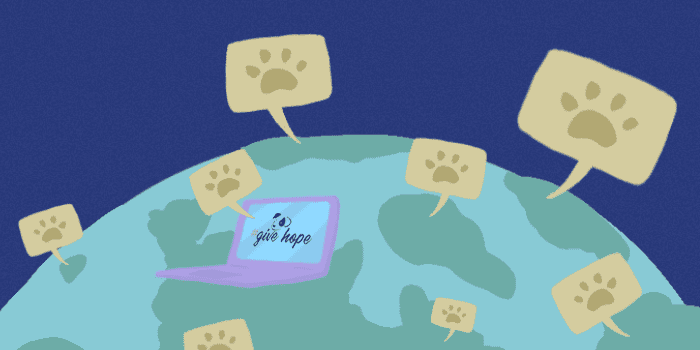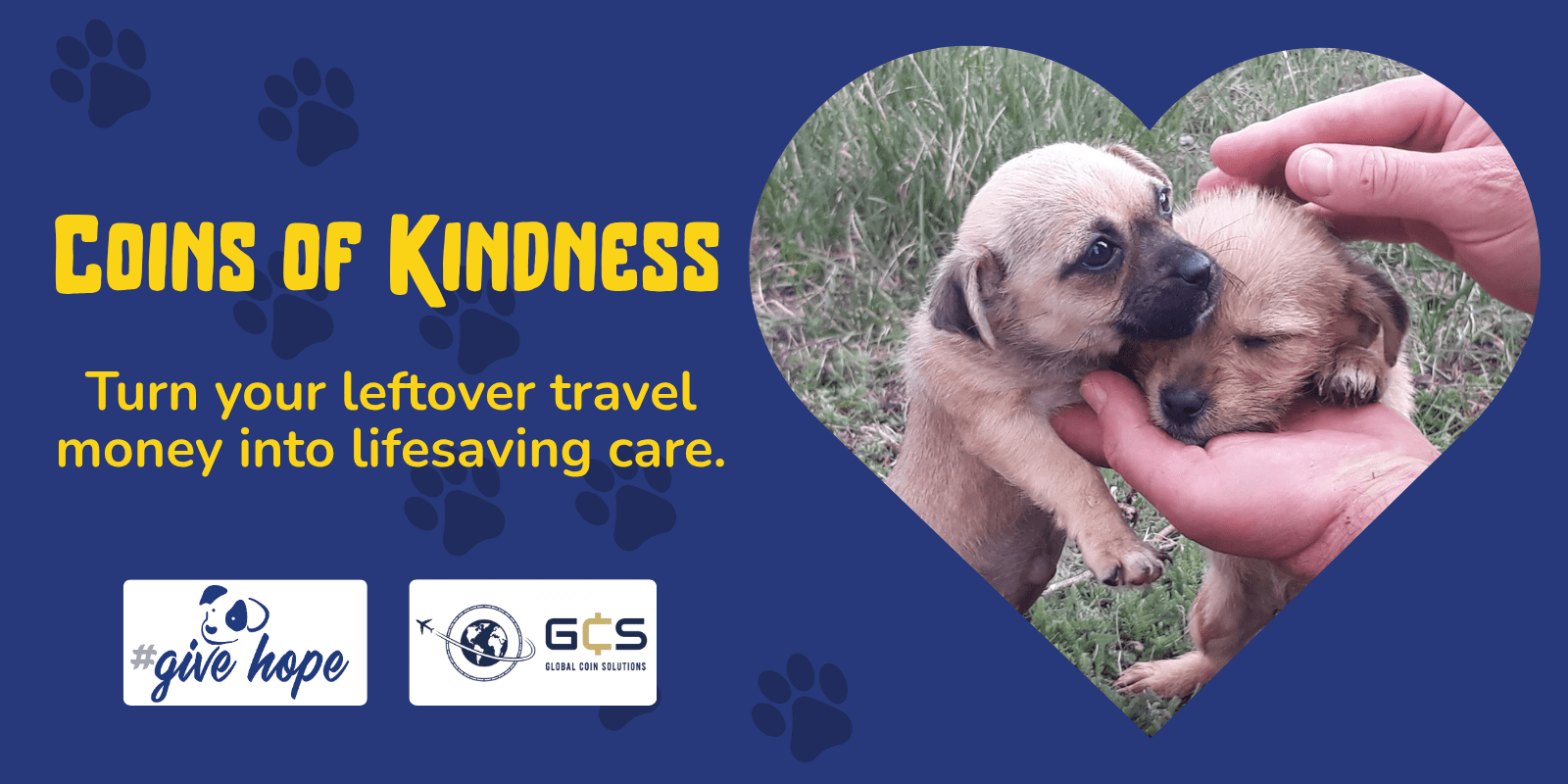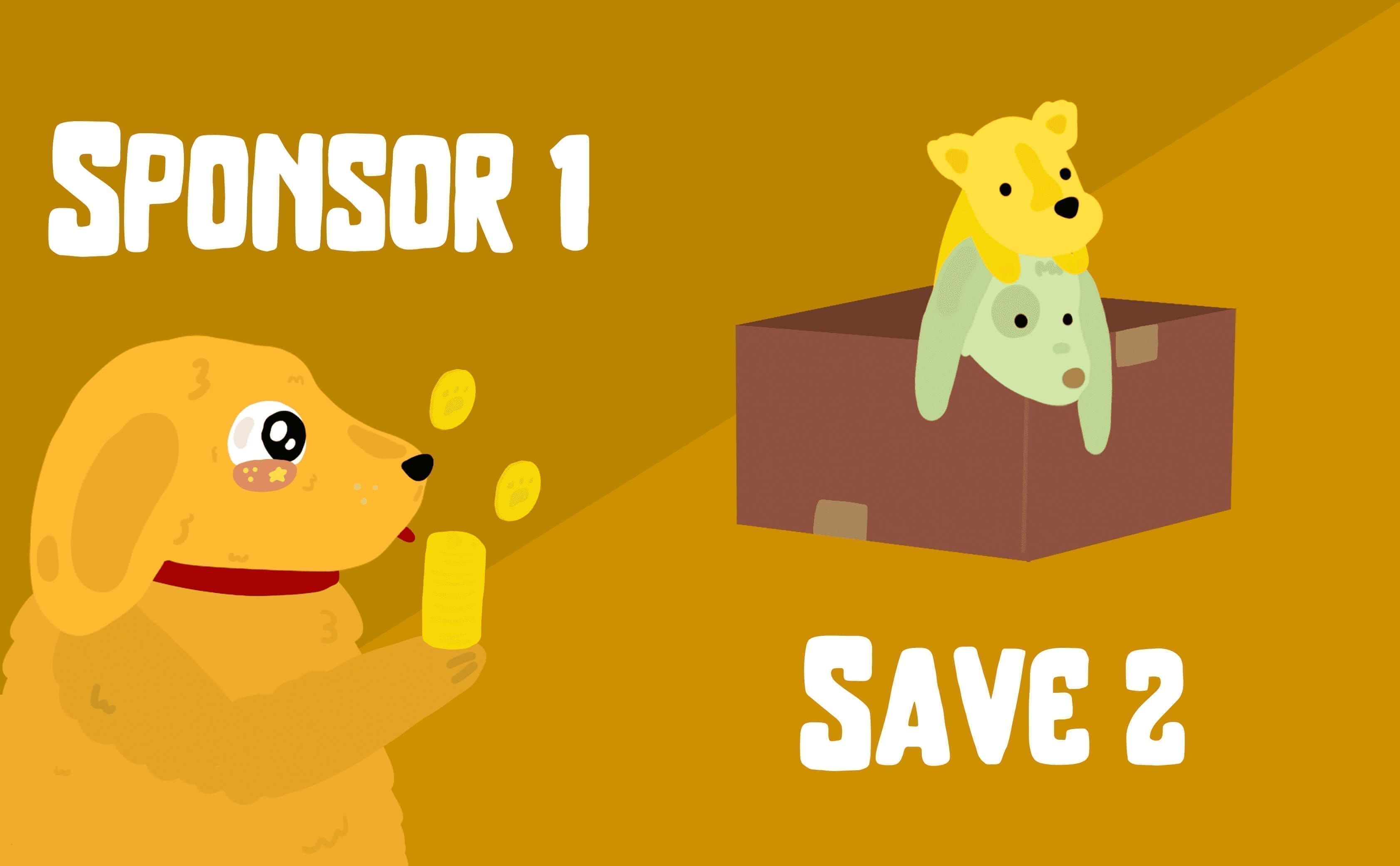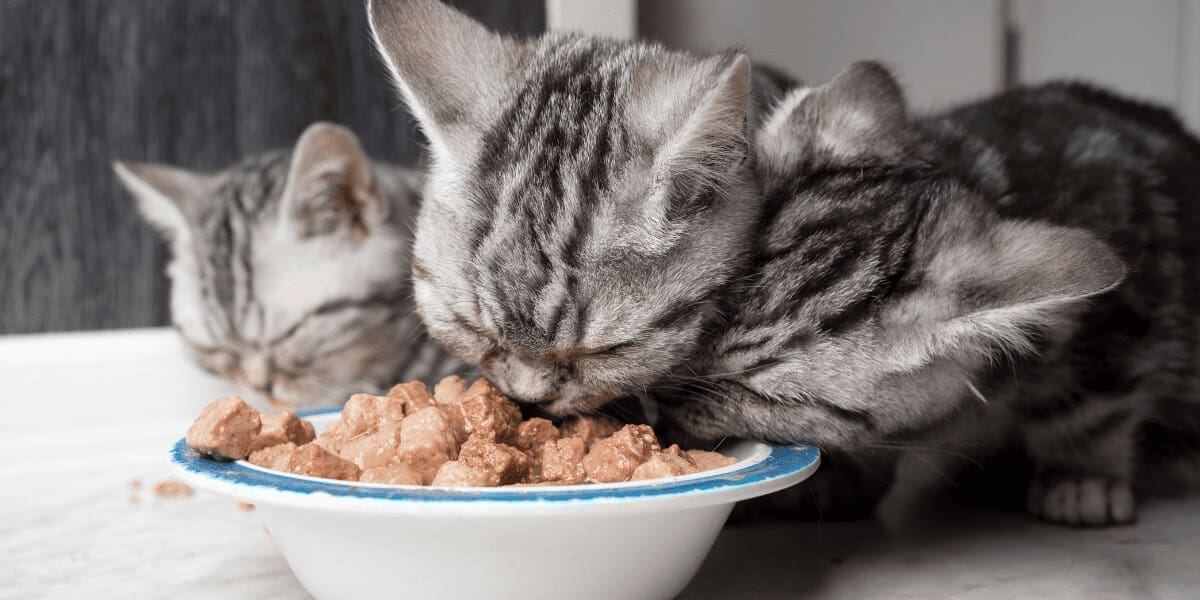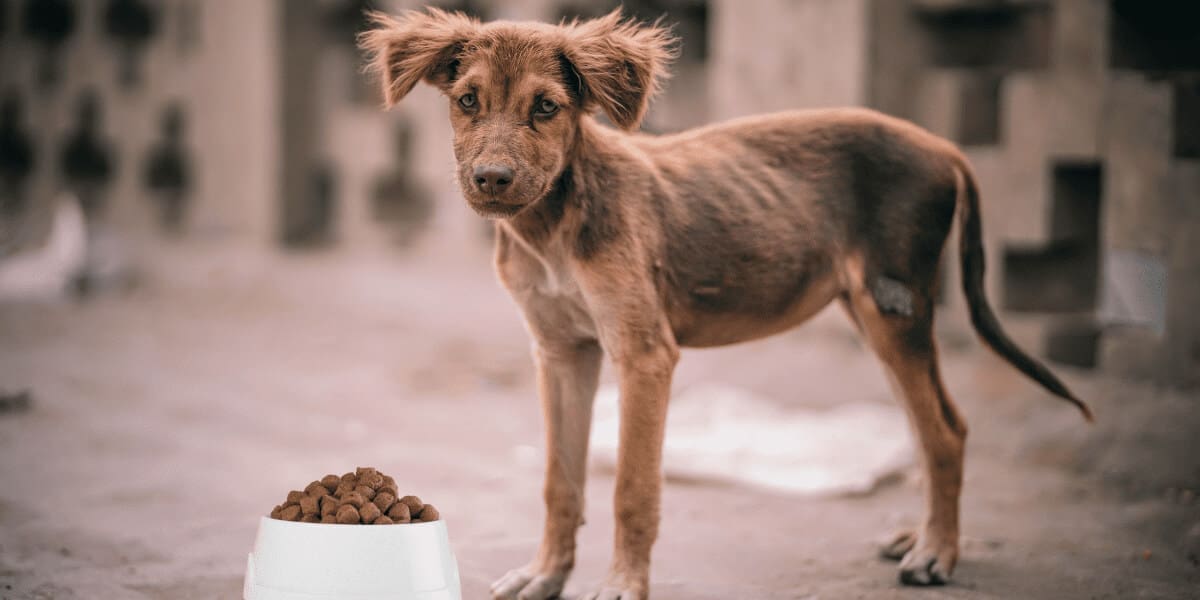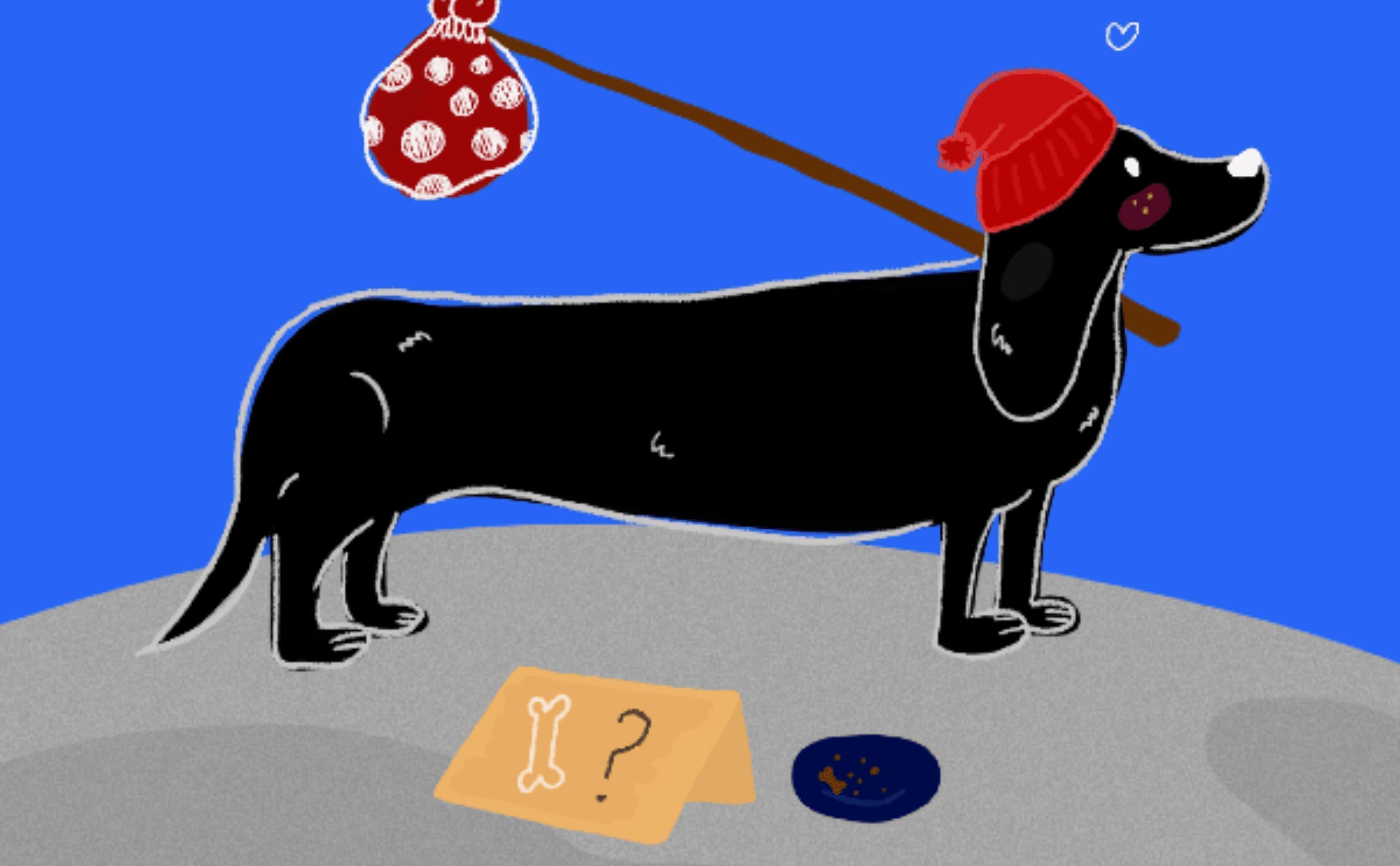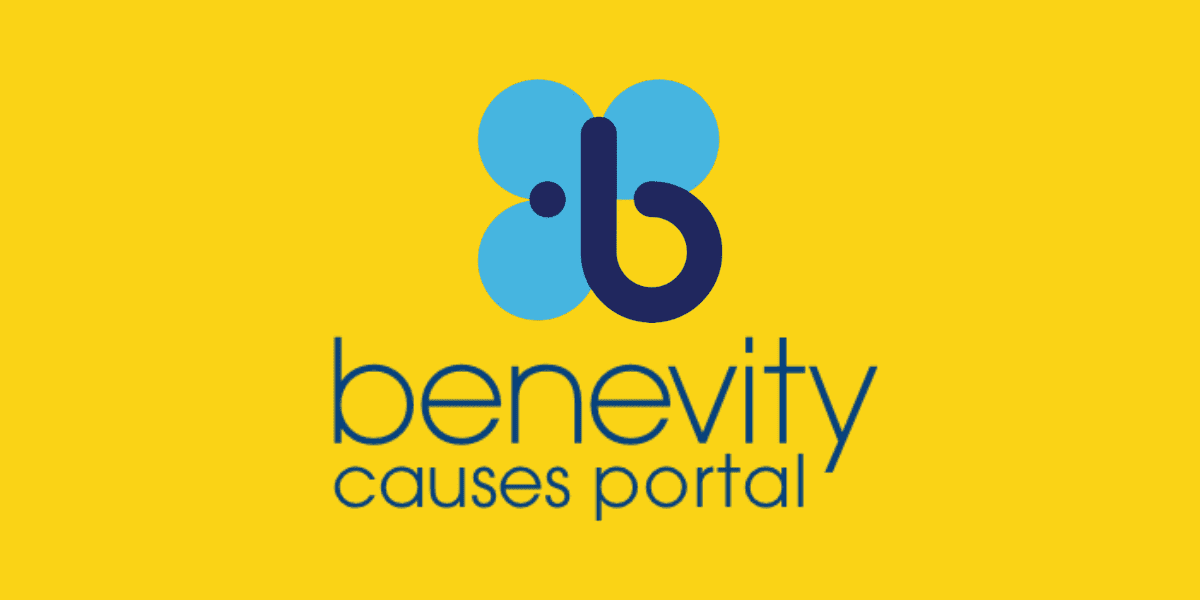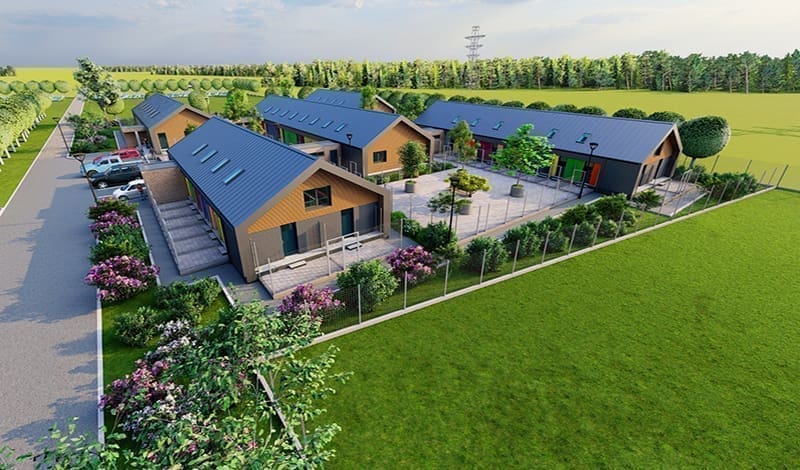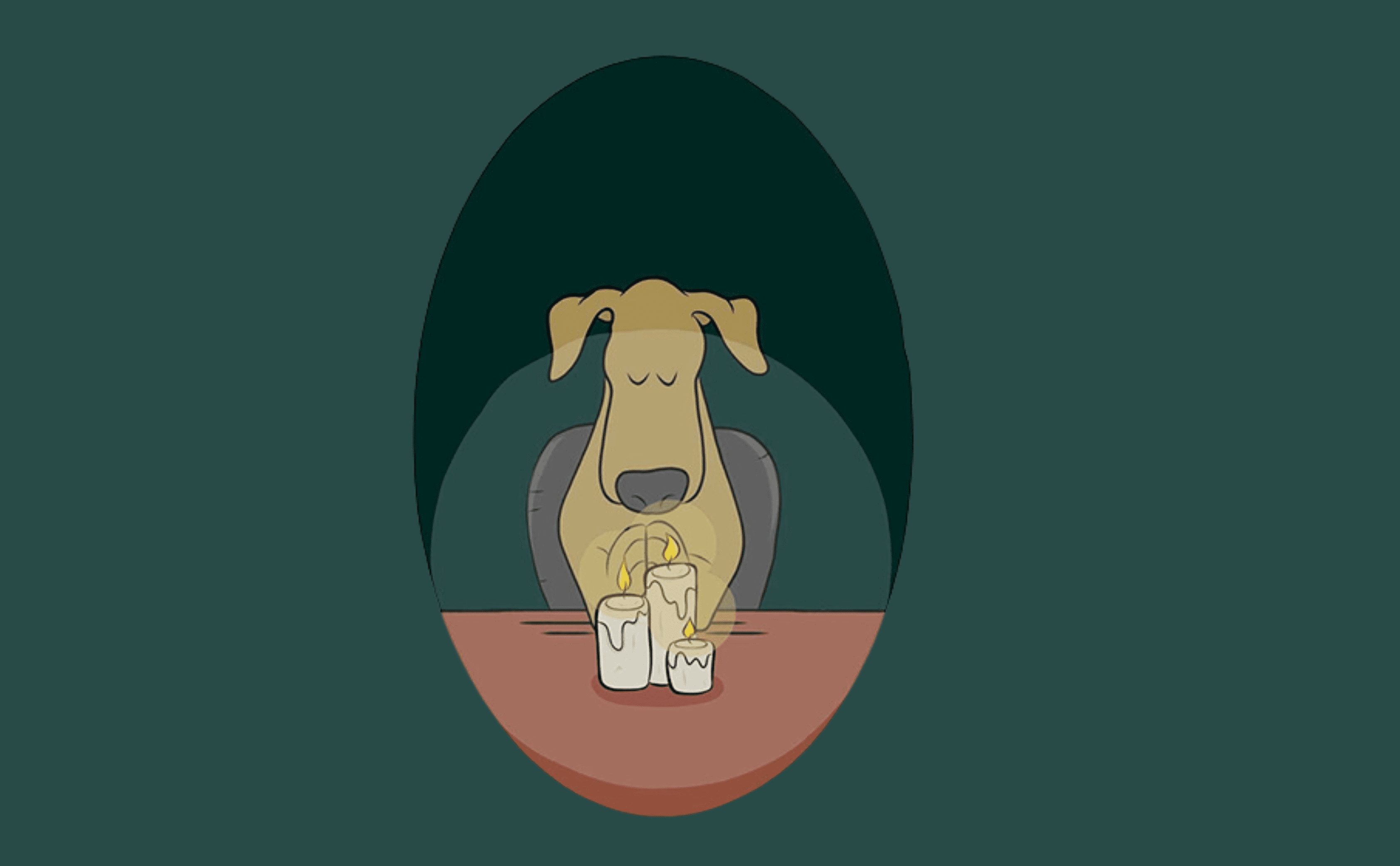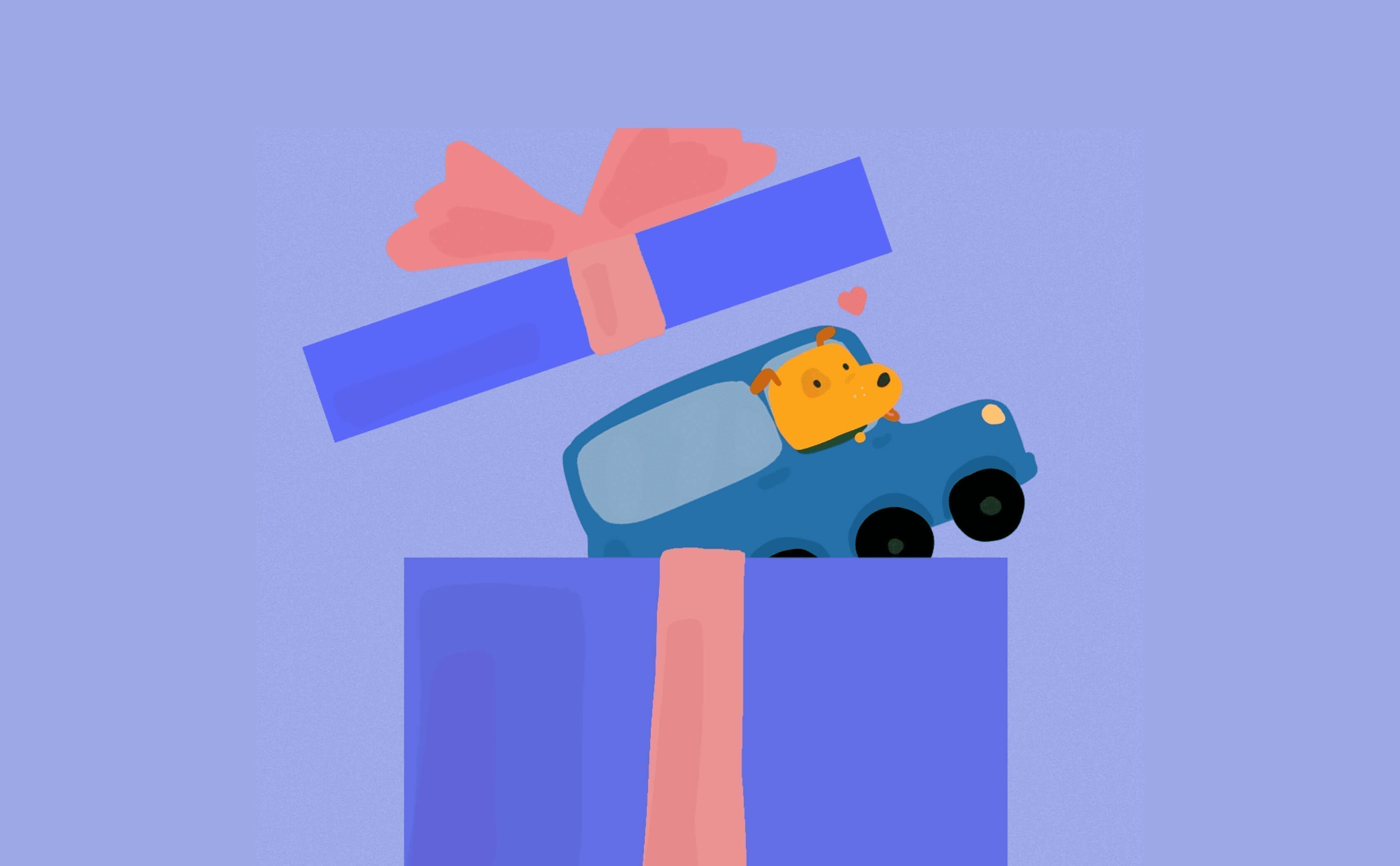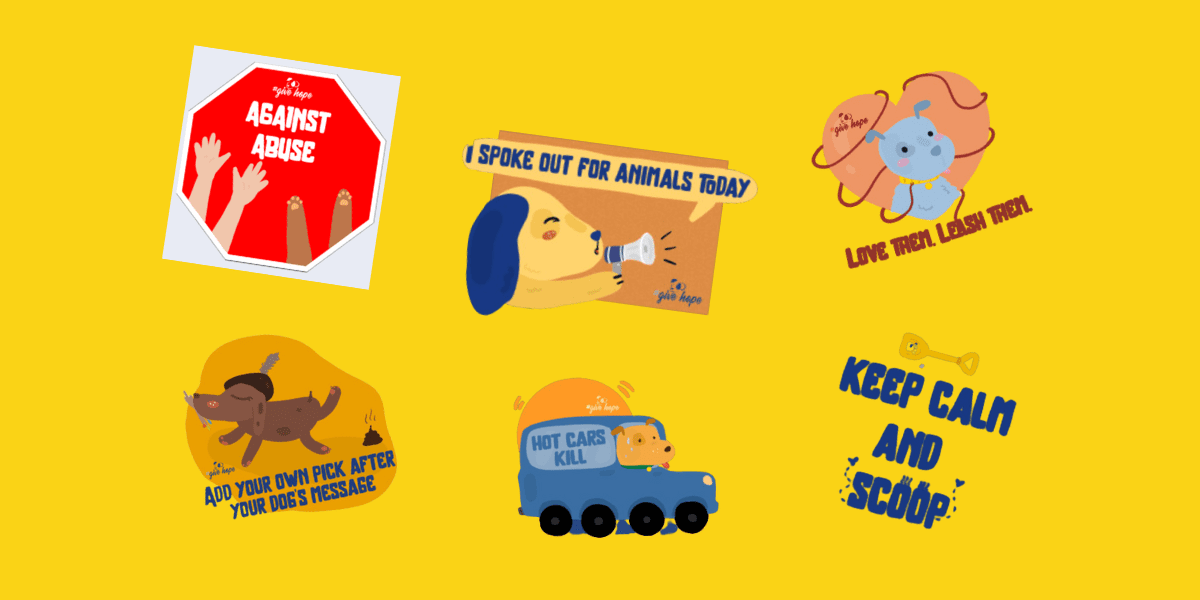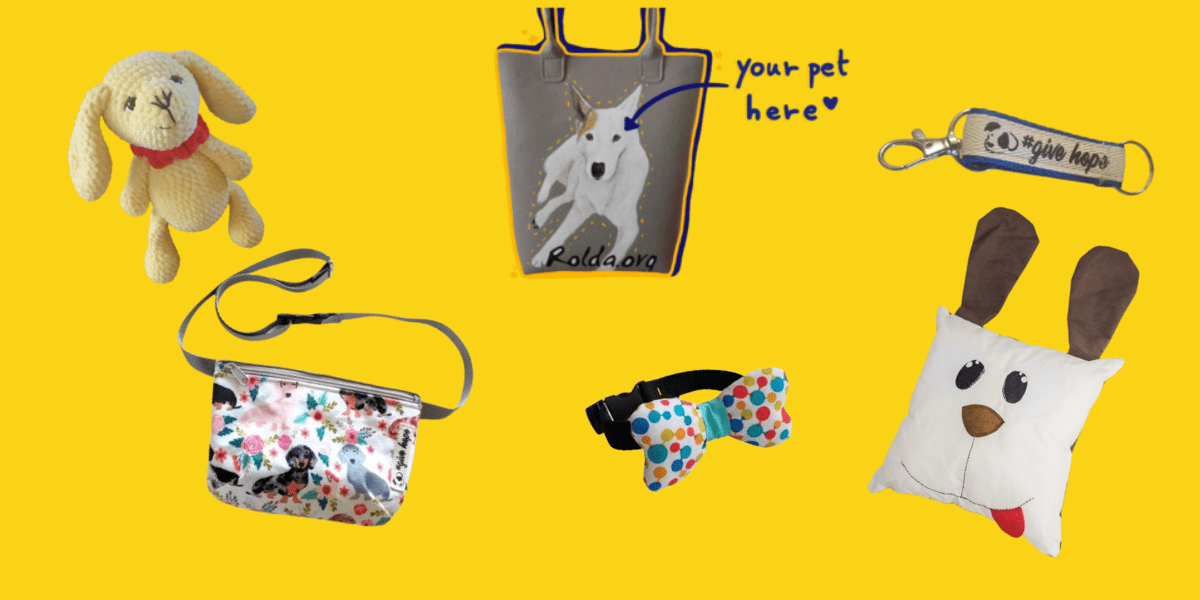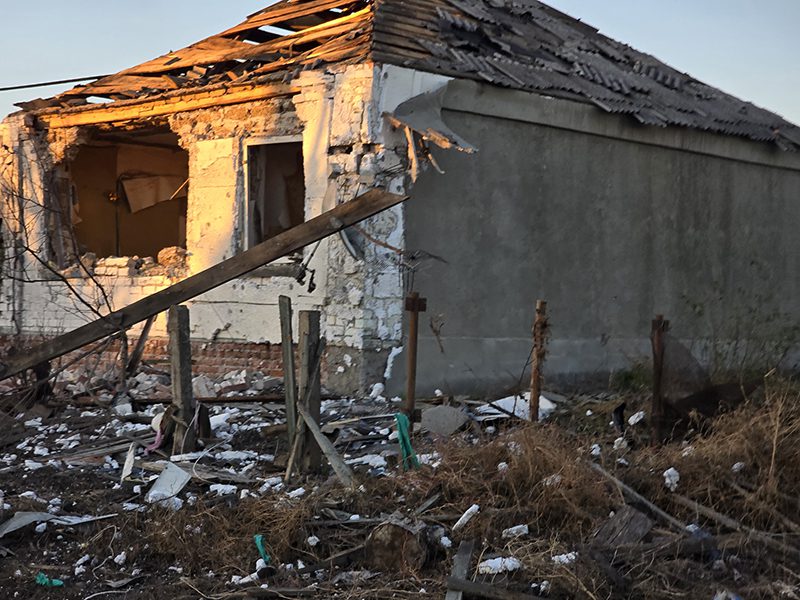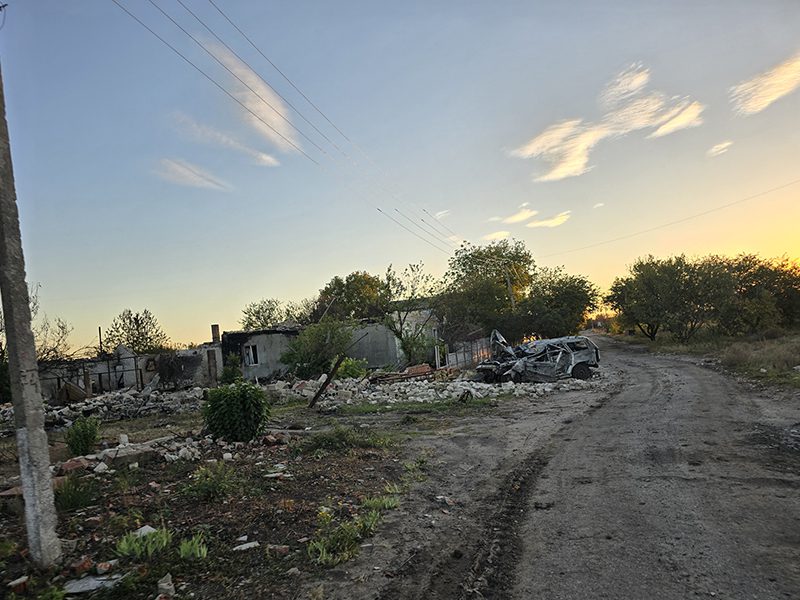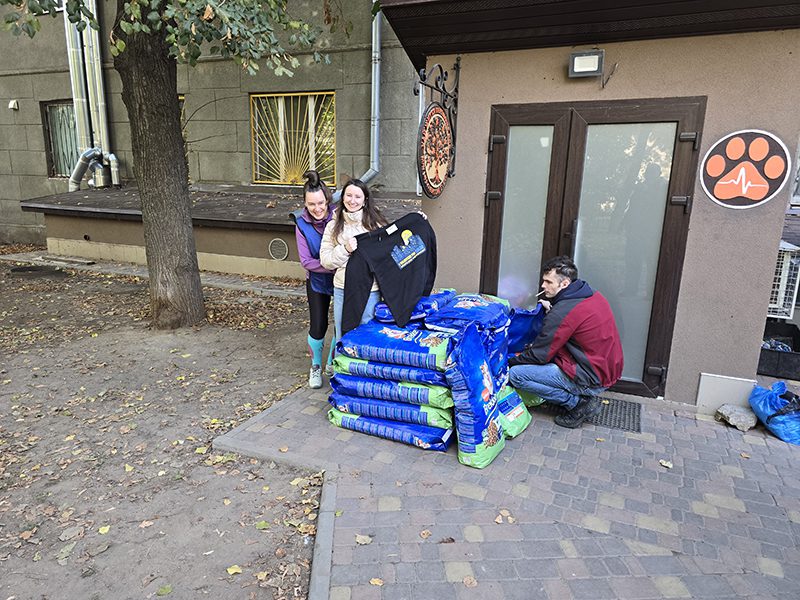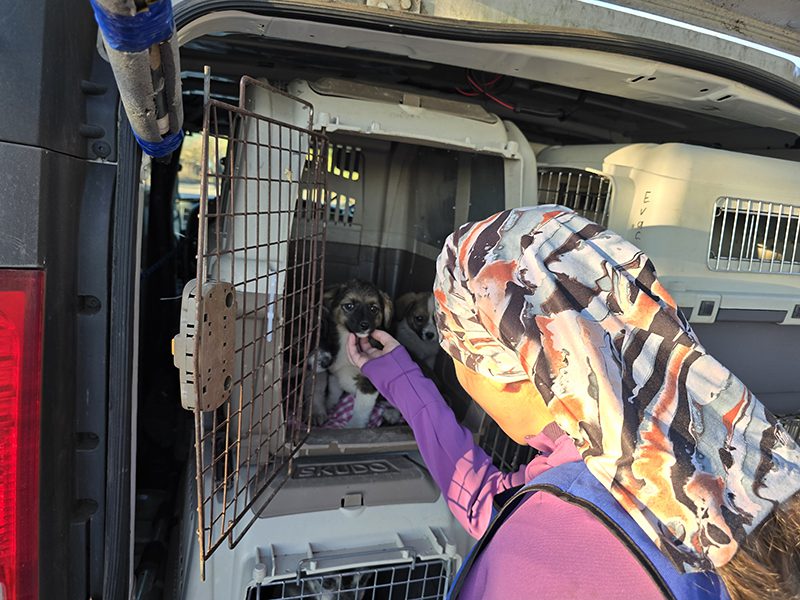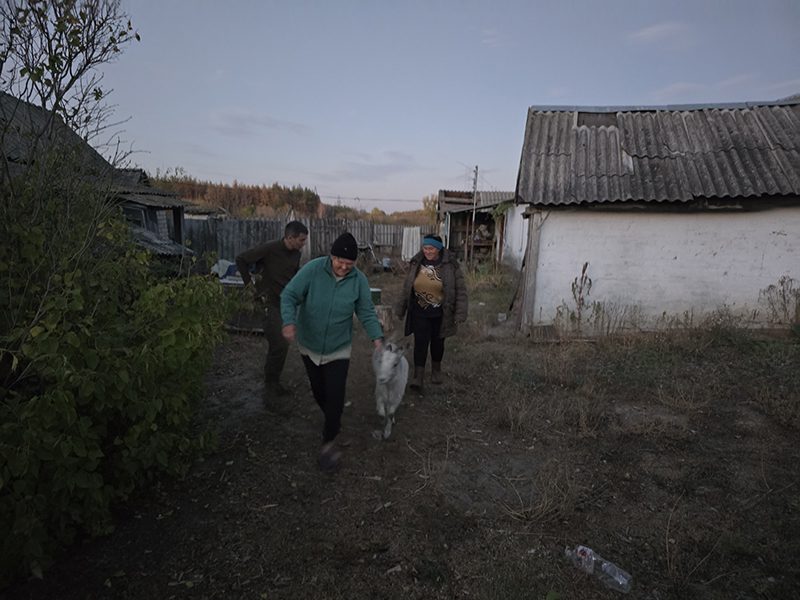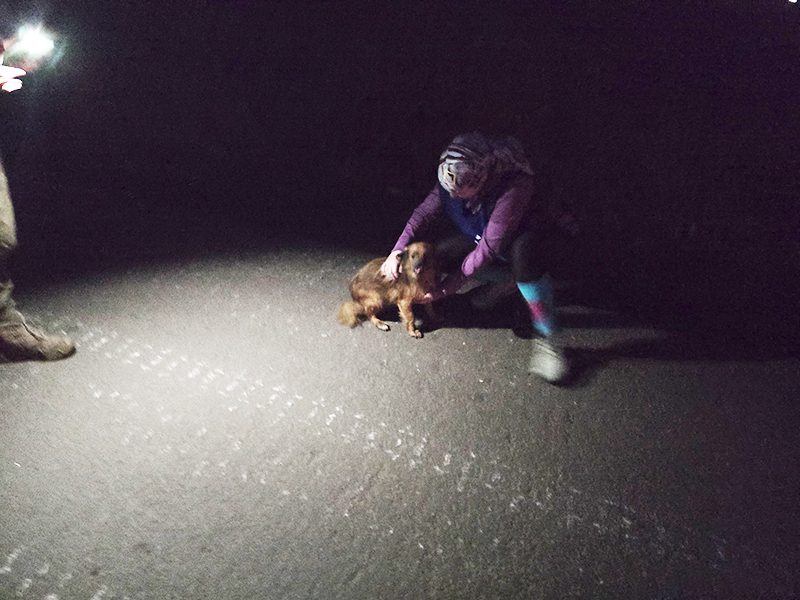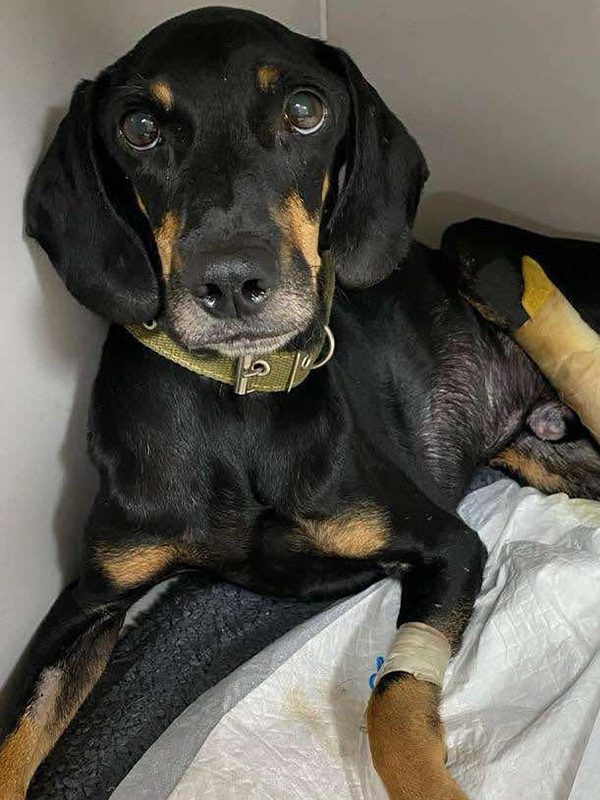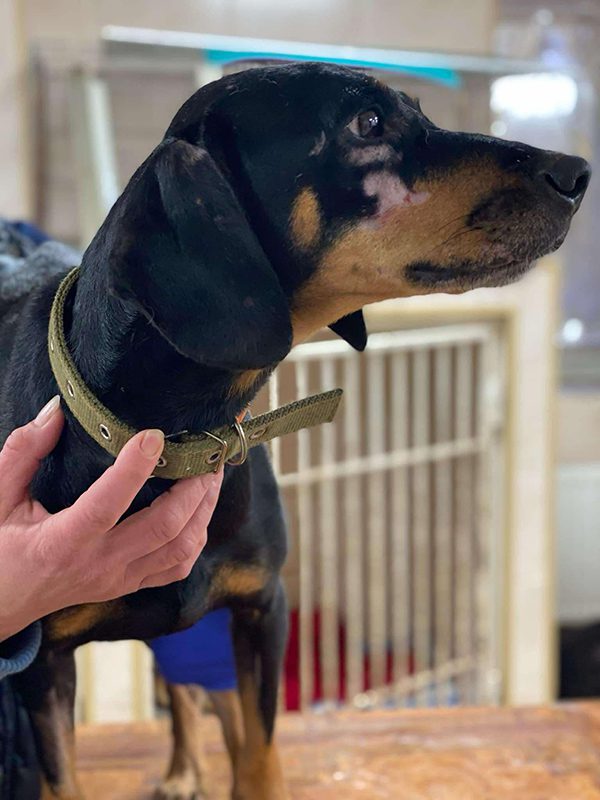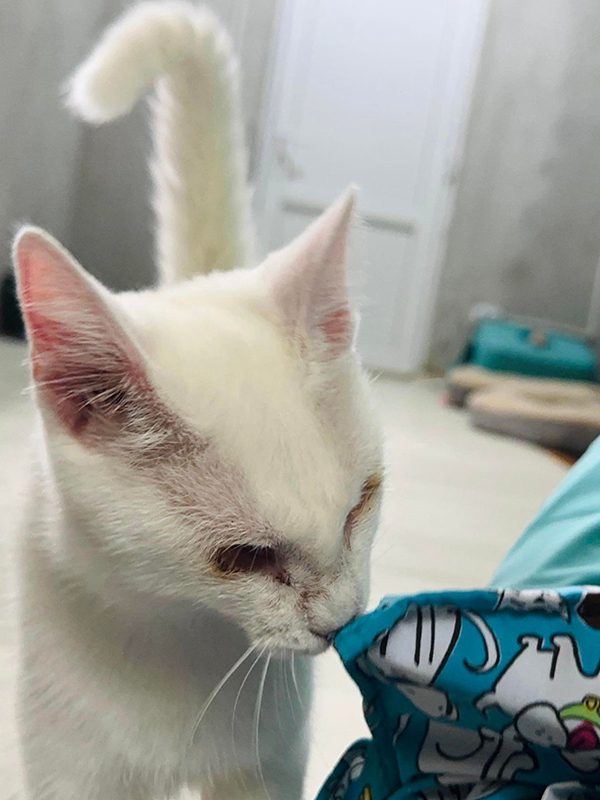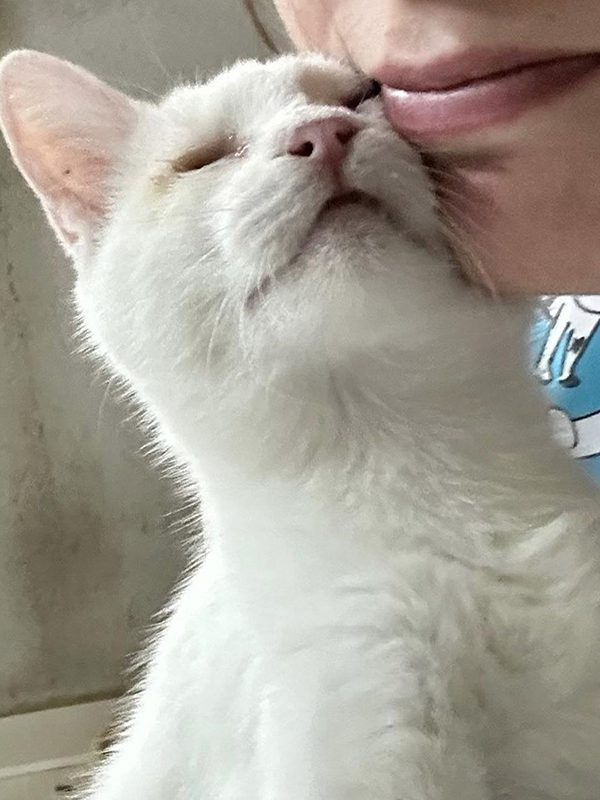Sarah’s journey is heartbreaking and yet inspiring. First, the heartbreak…Imagine being tossed out of the window of a moving vehicle. The instant spike of fear you would feel as it happened, the overwhelming building pain in the seconds after you hit the ground. The open wounds that would cover your body. That is what poor Sarah experienced.
Who could be so cruel? It is unimaginable that anyone could ever have so little empathy. After being thrown from a vehicle, Sarah was highly injured and undoubtedly in unbearable pain. We know now that she spent several days like this, by the roadside, unable to move. But it doesn’t end there.
Reliable reports confirm that whilst she lay by the side of the road desperate for help, she was struck by a passing car. A car that did not stop. Once again, she lay for several days, barely alive, unable to move.
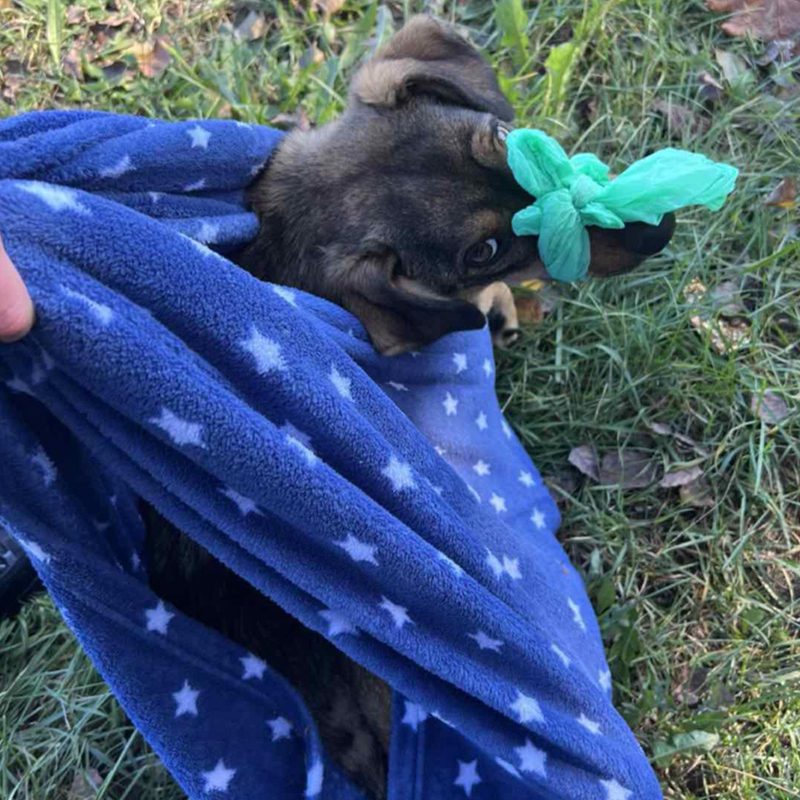
This is where a kind local volunteer, Lyubov, found her after hearing about an injured dog still showing signs of life. Curled up by the highway, Sarah was in a horrible state. She was exhausted, malnourished and could barely move due to her broken spine.
Sarah was taken immediately to a clinic in a very grim condition. Now, however, Sarah finally had the help she deserved. Lyubov ensured the ROLDA Rescue community could support a complex spinal surgery for Sarah, during which several implants were inserted.
As if by miracle, barely 24 hours after her surgery, Sarah stood briefly on her paws.
Sarah is now recovering in the clinic and has started to take small steps. She still has a long way to go, but her determination inspires us all.
Sarah and many others like her need your support to heal and find a better life. Please consider donating to help us continue saving lives and giving animals like Sarah a second chance. Becoming a regular monthly donor will make even more of a difference in the lives of animals who need it most.
Sarah’s story is an inspiration. No doubt, the surgery she received gave her what she needed to begin her recovery. But I am also confident that she is only recovering because she has a strong will to live. And I believe that her will to live is a response to the love and care she is now experiencing. Like many dogs, she responds so strongly to human love. And the love of ROLDA supporters like you is the inspirational magic that makes stories like Sarah’s possible. Thank you.
An inflamed and bleeding mouth. Kidney failure. Liver failure. Bibi, the little stray kitten, was suffering from all.
When our friends at the Great Catsby in Romania found Bibi, they immediately knew they needed to help her.
The Great Catsby is one of the shelters ROLDA is fortunate enough to support doing great work. Due to donations from kind animal lovers, ROLDA supports shelters across Ukraine and Romania with food and medical supplies.
Bibi overcame her challenges temporarily with a lot of hard work and time from dedicated volunteers. However, we knew that her condition was chronic and would require ongoing treatment to help support her damaged liver and kidneys.
After her initial recovery, Bibi was living happily among her feline friends at the Great Catsby, glad to be safe and off the streets. But soon, her kidney and liver refused to keep going.
For days, Bibi needed rapid interventions, infusions and frequent visits to the vet. She needed daily IV infusions, treatments and tests. Thankfully, Bibi is a strong fighter and has overcome this challenging time.
She is now back safely at the Great Catsby and continuing her usual treatment. Bibi’s life will be shortened, but we hope to make her final months happy and filled with love.
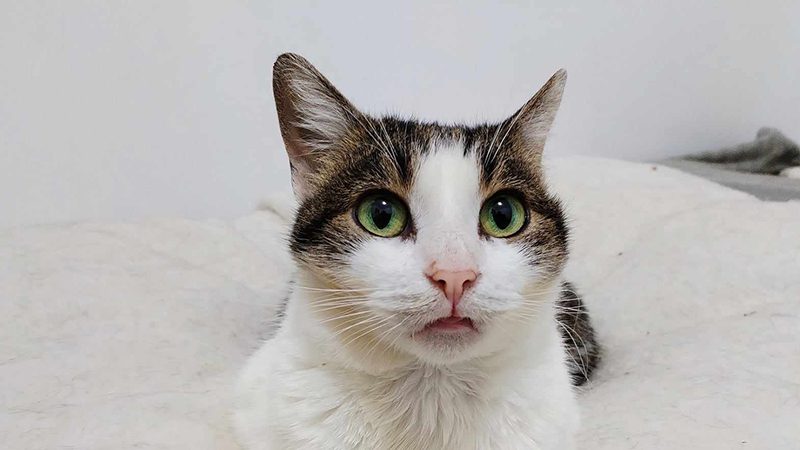
For the rest of her life, she needs multiple kidney and liver supplements, often hidden within her favourite treats.
Although Bibi may not make it to the end of 2025, she has made enormous progress since she was first rescued. She has transformed from a sickly, frightened stray kitten to the most loving cat in the shelter. She seems determined to share a long lifetime worth of love in the shortened life she has left.
Without dedicated rescue shelters like the Great Catsby, cats like Bibi would not be able to survive. Although her life will be short, Bibi gets to spend it happily surrounded by friends.
Sadly, more stray kittens are not so lucky. Stray cats face numerous challenges that can lead to illness, injury, or death. Malnutrition, disease, weather conditions, predators, and starvation are only some of the many obstacles that stray cats fight against.
As much as we love our dogs and as much as we understand their instincts, biting remains objectively wrong. This is primarily because of its obvious harmful effects and the legal implications for the owners of dogs that bite. Sometimes, it might depend on the context in which the bite occurred and the severity or whether it was provoked. In other cases, the law in your state or county dictates immediate punishment: the owner may be fined, the dog may be taken away, and it might even be euthanized.
There are many reasons to avoid this situation, whether the danger of snapping at strangers, other dogs when you are out for a walk, house guests, or, worse, family members and other pets living in the house.
But what do you do when the dog is old and teaching it to behave differently is challenging? Or if the biting results from old age and a change of character. Let’s address both issues. Let’s look at these scenarios.
Training an old dog to stop biting
Older dogs are more challenging to place for adoption. They are less active in the household dynamic and usually have additional medical needs the new family must cover. If you add to this a habit of biting, it makes it almost impossible to find a home for such a dog, not to mention the problem of keeping it with the others in a shelter.
As dog rescuers, we encounter dogs with many behaviors. Depending on what the animals have been through and their traumatic experiences with humans and other dogs, we usually assume that they could be scared and prone to biting us when we first meet them. This is not a generalization, but a way to be cautious when approaching a dog.
Some old dogs have lived on the streets for so long that they only survived by being the bigger threat. So, how do we handle such a dog when we want to place it in the same space with smaller, more docile dogs?
You probably have the old saying, “You can’t teach an old dog new tricks,” in mind. To some extent, this is true in the sense that you need to be more mindful of the senior dog’s needs and have a customized approach.
When you adopt an old dog with a biting habit
We will start by saying that although we believe every dog deserves a suitable home, we know that not all homes are good matches for all dogs. An old dog with a biting habit cannot be in a changing environment with a complex family dynamic, small children, and other pets.
In the chaos and agitation of daily life, it may be challenging for the dog to find its own place and some peace, and every loud situation might trigger it.
The people who can take on such a challenge can offer a calm environment with little to no agitation and schedule variation. This is a good starting point for a dog who has learned that a strong bite can solve problems.
How to deal with such a dog
Handling triggering situations is the main way to avoid problems.
The truly challenging aspect of adopting a dog with a biting problem is that it can come unexpectedly, as you may not know what the dog may find threatening. The general signs of a dog being about to bite are a changed body posture—a rigid back, and a tail tucked between the legs, the head turned away, and the constant licking of lips. These may or may not be accompanied by a low growl.
Therefore, avoid sudden moves and excessive noises around the dog. If the situation demands it, you may use a muzzle. There are plenty of comfortable solutions that still permit the dog to eat and drink without being able to bite down and harm anyone.
It is also best to keep such a dog away from house guests, especially children.
A professional dog trainer could provide some valuable tips meant to help, depending on the dog’s aggressiveness level. Here are some of the key things to remember:
– Avoiding triggers.
– Realising the possibility of the dog biting and trying to divert its attention.
– Reaffirming that it is in a safe environment where it no longer needs to use its hard bite, as you are not a threat, and it needs not become the alpha.
When your old dog suddenly develops a biting habit
Old age can cause confusion and frustration, even in dogs. And, yes, even the sweetest and most docile of dogs can become like grumpy old men, snapping at everyone. The only problem is that their snappiness can cause injury, so you must be extra careful.
First, address the issue and get an assessment from your vet. Make sure that there is no other underlying medical cause for this situation.
Once old age is established as the sole reason for their irritability, you handle the context as much as possible.
– Avoid chances of scenery and space.
– Avoid bringing around too many people if this would be a change for your dog.
– Do not leave it alone with small children and young pets. Small children and young pets can be tiresome and frustrating with their chaotic behavior.
Then, to teach the dog not to bite, you have behavior modification programs. Professional trainers use these for dogs with hard bites. Before the “no bite” command, you have the DISRUPT, DISTRACT, AND DIVERT option. This technique takes the dog out of the mental state in which it is building its aggression, reassures it that there is no need for the hard bite, and gives it something else to think about.
Typically, people use this technique for younger adult dogs who are in the habit of mouthing or whose bites are getting harder. These diversion techniques may not work as well on older dogs, as they are too much in their mindset, less playful, and therefore less likely to be deterred by having something to chew on.
The best way to handle this situation when dealing with an older dog is to learn the triggers and keep him away from them.
Changing things around the house, even moving, introducing new people all at once and in stressful situations, and breaking the routine it is used to. As people and animals age, moving around and going about their day gets more complicated. Therefore it is important to keep up the household’s general flow and keep most things where they are as much as you can. Otherwise, some major changes could be too much for your old dog to work around.
Getting a puppy can be the most exciting moment of anyone’s life. Even as children, we dream of the unbreakable bond we will have with our dog, a bond created since puppyhood. The training part, however, hits like a ton of bricks!
As aware as you might think you are of all the things you need to teach your dog from scratch, the crying and whining will be the most frustrating. You will feel like giving up, like what you are doing is not good enough, and even feel tempted to give into those notions of not being strict enough. But before you second-guess your decision, know that you are not alone in this.
Training puppies is difficult and taxing. Even professionals sometimes get frustrated, and they already have all the information. But you will get there, and once you power through this period, you form that amazing bond with your dog. Let us give you a few pointers on how to do it.
Why do very young puppies cry?
Phases of puppyhood
When they enter the world, puppies’ eyes and ear canals are closed for the first two weeks. All they can do at this point is sleep in the safety of their siblings, be in close contact with each other, crawl to their mother, following the smell of milk, and nurse. Therefore, eating and feeling the close physical contact of the mother and siblings are the only things puppies can do now.
A puppy that has crawled or been pushed away from the litter will whine and cry to signal distress so that the mother can find it. These are the only ways of communicating, and they are purely instinctive. Remember that these are sounds they make before they can even hear anything.
As puppies grow, they trade crawling for walking and running around. This time in a pup’s life is exploratory when they become slightly more independent and curious about the surroundings. Once they’re done exploring, they’ll want to go back to the comfort of the litter.
By 6-8 weeks of age, the mother will start weaning the pups, and they will be ready to find new homes. This is the best time to get your pup.
Getting a puppy too young
Sometimes, pups that have not yet been weened will remain without a mother, and humans will need to step in. Training at this point is useless, as the pups should still be with their mother. The puppies still depend entirely on the mother for survival.
If you get a puppy that is still one to two weeks old, comfort it very often, provide a safe and warm space for it to sleep in, and feed it often. If you sign on for this, you cannot complain about crying and whining because the pup would be too young and dependent on your care to dismiss its signaling.
Anything under the recommended 6-8 weeks falls into this category.
Getting a puppy at the right age
If your puppy is the right age, has already been weened, and is ready to come home with you, you are still in for some crying sessions. Mom is the first to know the weening is done. The pups will eventually find out that they are on their own, and it will be a rude awakening for them.
Expect any pup to need time to adapt, from sleeping with brothers and sisters and having a readily available buffet to sleeping alone and waiting for mealtimes. You would probably cry, too. Most likely, you did when you were a baby. So, have some sympathy for the poor pup.
Adapting to the new environment and rules will often be met with frustration because it is a change and a challenge, but your puppy will get the hang of it! Also, you are out of the “too-small-to-get-it” phase, so let the training begin!
Why do puppies cry?
Because it is not in close contact with anyone
After having been together with the others for so long, your puppy is suddenly sleeping alone in a new place. You will notice discomfort as you see it curled up tightly. It is its body’s way of replicating the sensation of physical touch.
Because your pup cannot see you
Going away and coming back will be a challenge for pups for a long time. Just be patient and understand that your dog loves you so much that your absence is causing distress. It will eventually understand that you are not leaving for good.
Because of hunger, cold, pain, or any type of discomfort
This is a puppy’s only form of communication. It may seem tiring to figure out what your dog is complaining about every time and sort out emergencies from frustration. Puppyhood is a time in which you both get accustomed to one another, and, in time, you will know how to tell. Plus, as your dog matures, there will be less crying.
Out of boredom
Puppies have a lot of energy. You cannot expect them to lounge about and sleep all day like cats. Also, this can depend on the breed. But, in general, puppies are energetic and crave attention and companionship.
How to address the needs of a crying puppy
Mentally, list the possible reasons your puppy may be crying.
– Is it in any danger?
– Is it pain? Does it look physically distressed?
– Has food and water been made available at the right time?
– Is the bedding soiled and uncomfortable?
– Has the puppy not seen me or anyone in the family for a long time?
– Has the puppy had no playtime for a very long time?
– Has any of its comfort items been removed?
– Has the puppy reached a situation it cannot get out of by itself – like getting stuck behind the couch?
Other questions may be more particular to your situation. But here is how you address them.
Your vet will tell you how much sleep, food, water, and playtime your puppy needs for a healthy and balanced life. Always make sure these parameters are met. Sometimes, your pup may tip the water bowl and go thirsty, not get enough exercise, or be too young to be left alone for too long.
The younger the puppy, the more you will need to check whether there is just a reason for it crying out. Older dogs will usually get the hang of it. Instead of a puppy’s general language of crying for everything, they will bark to inform you of anything in particular.
Also, check for situations you may not notice, like accidentally placing a toy in a place your puppy cannot reach more than once. You can change time, and your puppy will no longer be distressed about some issues.
What to do with a puppy that is crying all night
We know. It’s challenging to be patient when you lose sleep over your puppy constantly crying through the night. It feels like you have a newborn baby in your home, right?
Like a sleep-deprived parent, you will still need to keep up crate training, and we know things will eventually get better.
Your pup might feel distressed because it is too far away from you. If you plan on keeping the crate in an unfamiliar room, maybe ease into the transfer instead of placing it there from the beginning. While the puppy is still tiny, keep the crate near the bed and stick a hand in so the puppy can smell you and know you are near.
Then, as he grows accustomed to sleeping in the crate and needs less reassurance, you can start moving it. A good idea would be to put some old clothing in the crate with your scent on it. The smell will comfort the puppy and try to seek you out less.
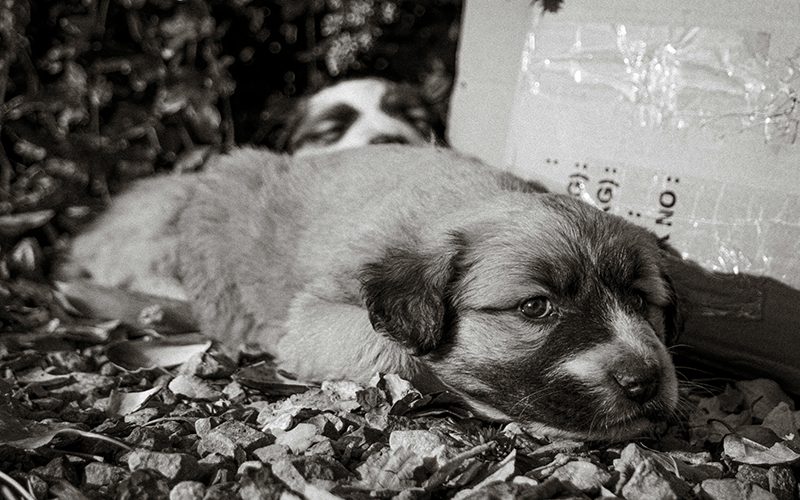
The cry-it-out method
This is no longer recommended for babies; we do not recommend it for puppies either. Just like babies cannot self-soothe, puppies can cry themselves into distress, causing them to associate the crate with something extremely bad. When you intervene, it is too late, and you can no longer have a safe notion of a crate.
Ignoring a crying dog for a very long time is no longer the way to do it. Instead, try filling the crate with everything you puppy likes, fluffy stuff with the smell of the favorite family member, toys, and whatever would make it feel comfortable, safe and inviting. If other animals are in the house, do not let them in the puppy’s crate, and make it clear that it is a personal space.
Go to comfort the puppy in the crate—it would be best not to pick it up—then leave and come back one minute later next time. It might take a while, and it is not like the cry-it-out method, but it doesn’t ignore a distressed creature.
Practice alone time
Even if now you may have the time to spend with your pup and maybe you have the luxury of a house full of people to choose from, there might come a time when your dog will have to be left alone. Practice makes perfect!
Do it in small batches and increase the time intervals. Always greet and play with it more upon your return.
Lots of exercise
Do you know who sleeps best? Anyone who is tired and has worn out every drop of energy. So, make the last walk of the day an extensive one. Include active playtime, and make sure you consume all the energy your puppy has.
This is but a moment in your lives. As difficult as this time may seem, we guarantee you will not remember it as you grow more accustomed to your routine and life together.
Here is something that sounds difficult to do before you have a dog: understanding them and being able to have a “conversation.” You might think that only professional trainers and seasoned dog owners will know the significance behind every sniff and growl. Still, the experience will soon teach you that any dog owner with a connection to the dog and a genuine desire to learn to speak its language will know.
Studies show that dogs understand over 100 words. Let’s see how many of your dog’s cues and signals you can be “trained” to understand.
How do dogs communicate?
It may surprise some, but dogs are very ‘talkative.’ They bark, use facial expressions, make a specific type of eye contact, and posture. Dog owners need to know their dog’s personality and be able to understand what they’re trying to say through their actions.
Dogs will tell you exactly how they are feeling. All you need to do is look at them, figure out why they act that way, and act accordingly.
The most common ways in which dogs communicate
Tail wagging
A wagging tail signifies a happy, playful dog, right? Well, sometimes.
When a dog wags its tail, it is usually a sign of high excitement. Yes, it may mean it is happy to see you, but it can also signify frustration. According to some studies, you need to look at the position of the tail, the speed at which it is wagging, and even the direction of the wag.
The faster the tail wags, the happier and more relaxed the dog is. Everyone can recognize the helicopter movement of the tail, which you can see when a dog greets a loved one. A slow, twitching movement of the tail, combined with other body cues, may mean stress and frustration—like a guard dog being alert.
Recent studies have also shown that wagging their tails more to the right has a positive meaning while wagging them more to the left has a negative one. Therefore, people discuss the direction of the wagging tail.
Another sign is the position of the tail. A dog will hold its tail higher to appear more assertive, making itself look bigger. The lower the tail, even wagging from between the legs, the more submissive it tries to look.
The best way to interpret tail wagging for yourself is first to understand the neutral position of the dog’s tail, given its breed and constitution. Then, put movements in the proper context. A helicopter tail wag may be reserved for you, and a slow-paced wag may be reserved for a stranger at your dog. Always consider the context when you are still studying your dog’s cues.
Raised hackles
A slow-wagging tail and raised hackles mean your dog is on high alert? The fur on our dog’s back, from the back of the neck to the tail, will fluff up whenever the dog is upset, stressed, excited, or simply highly interested in something. You will notice it is accompanied by barking or intense sniffing of something or someone. This reaction is like when people get goosebumps.
It might not mean something wrong, but it’s best to be alert when you notice this, just in case their interest peaks with something they might perceive as threatening.
Ear positions
Reading into this might depend significantly on a dog’s breed and ear shape. Flappy ears are the norm for a relaxed pup. Ears pinned to the head and a submissive demeanor means your dog is looking for petting and cuddles and is warming up to you. However, ears pinned to the head, raised hackles, a slow-wagging tail, and showing teeth are bad. It means the dog is on high alert and even getting ready to be aggressive.
Ears sticking up (provided that the dog’s constitution allows it) and a playful look means the dog wants to play and spend quality time with you. Ears sticking up, raised hackles, and a fixed posture mean the dog is alert and intensely analyzing a situation.
Breeds with long and floppy ears may be more challenging to read because they do not control the muscles that allow such movements. So, their owners must watch for other signs of playfulness or high alertness.
Eyes
When a dog looks lovingly into your eyes, sighing occasionally, it says, “I love you.” People will only accept this level of intense eye contact the dog feels comfortable around.
Strangers making intense eye contact with any dog will frustrate it, and you will see it try to look away. This is a clear sign that the animal is uncomfortable and that insisting on and keeping it in that situation will have some risks.
Whale eyes are when you can see a lot of the white of the eyes as the dog has a fixed stare with widening lids. This is a sign of frustration and anxiety. Dogs will look like that when they are afraid and uncomfortable.
Mouth
Some of the dog’s facial expressions may seem similar to what humans do, but they say something else.
Yawning is a way to release stress. Yes, dogs will also yawn just after waking up or when tired, but a yawn outside this context usually shows that they are stressed. Some dog training professionals even use yawning as a technique to de-stress dogs. You can use it when heading with your dog toward a stressful situation, like a vet visit. Try yawning, and you will see your dog doing the same. This will help relieve tension.
Lip-licking is tricky, especially when a dog is too fast for you to see the flick of the tongue. It is a sign of growing anxiety and discomfort.
Smiling is something people do. It can be one of two things when you see it in dogs. A smile with a relaxed face and a wriggly posture usually means a submissive grin. However, a smile with the front teeth fully displayed and the corners of the mouth shaped like a C would be a snarl and a sign of aggression.
Posture
Body language is essential when understanding what your dog is trying to say. There are two postures with opposing meanings. The cowering posture, where the dog is hunched toward the ground, with its back curled up and its tail tucked between its legs, to make itself appear small and not threatening. This is the posture of a scared dog.
Its opposite posture is one in which the dog’s body weight is shifted forward as if ready to lunge. The dog is trying to make itself appear larger and could have aggressive intentions.
The play bow is when the dog’s chest is placed on the ground while the rump is up. A wagging tail, ears held upright, and a cheerful disposition show that this posture is an invitation to play.
Two postures often misinterpreted are the paw raise and laying on the back. The paw raise can usually signal insecurity, so check the overall look of the dog and the context. Lying on the back can also be misinterpreted, and people may think the dog only asks for a belly rub. If this posture is accompanied by urination, the dog is highly stressed and anxious.
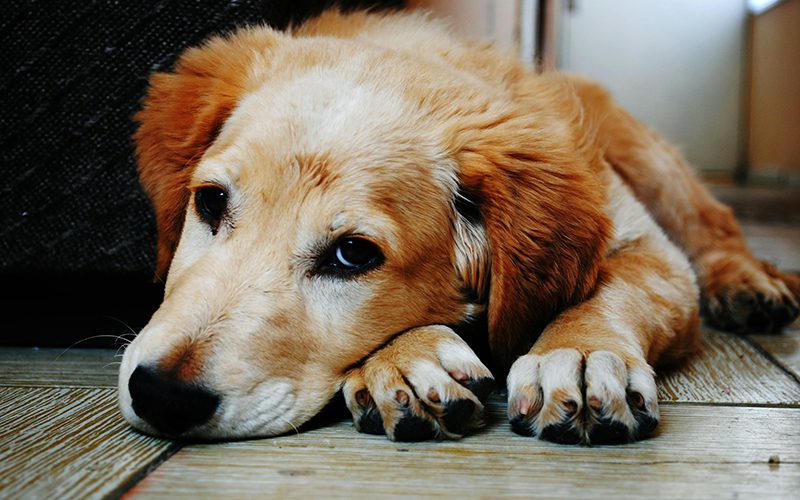
Why is knowing how to interpret your dog’s body language so important?
The Internet has videos of people giving dogs hugs and kisses and getting almost bit in the face. Dog trainers watching these clips have noticed some big mistakes in people misreading the signals sent by the dogs.
First, dog noses are a lot more sensitive to smells than human noses. This means that getting so close to a dog as to give it an unsolicited hug or a kiss is ill-advised. Second, to anyone who has learned to read a dog’s body language, it is obvious from the hard stare, the whale eye, the lip-licking, and the ‘smiling’ that the dog is not comfortable and that it might express this dissatisfaction.
While most dogs are docile and will come in for hugs and kisses themselves, this type of affection showing is not natural to them, but something they need to adapt to and understand that this is how you express love.
Therefore, knowing the basics is more than just the beginning of fruitful communication; it is also the basis of a more solid relationship in which you truly understand your dog’s needs and know how to make its life more comfortable.
Compassionate Impact Report: capturing the sights, sounds, and stories of resilience.
With a heart full of dedication and compassion, Dana Costin, CEO of ROLDA, embarked on a five-day mission to Ukraine in October 2024 travelling to the Kharkiv region, where she provided crucial support for animal rescue operations near the front lines. With a van packed with food and other necessities, she spent two days driving the war-torn path from Galați, Romania, to Odessa and Mykolaiv, the unsettling drone of distant air raid sirens and the delays at customs serving as a constant reminder of the precarious peace in the region. Undeterred, Dana pressed on to Kharkiv, where she found the ARK team, their faces etched with exhaustion but their spirits unbroken, tirelessly working to save animals caught in the conflict’s crossfire.
The constant exposure to suffering and death near the front lines takes a heavy emotional toll on rescue workers. In Kharkiv, Dana witnessed the heart-wrenching scene of locals, their faces etched with anguish, reluctantly parting with their cherished pets, their lives turned upside down by the devastating war. Rescue teams like ARK and ROLDA, with the help of their partner Ruslan, brave perilous environments, retrieving animals from destroyed homes, deserted farms, and even war-torn battlefields. “The animals seem to understand,” Dana noted, observing their silence during high-speed escapes from dangerous areas—where they drive without stopping, even with lights off to avoid detection.
Each animal saved in war shows their resilience and the compassion of their rescuers.
Ruslan, a skilled driver and rescuer, brought Dana to Borova and nearby villages. He rescues animals, comforts victims, and collects food donations while navigating dangerous terrain. The bond between humans and animals was clear when soldiers gave their food to rescued puppies.
Each step of the journey underscored the immense financial weight these life-saving missions carry. The van’s engine roars constantly, fuelled by a steady stream of gasoline, as it battles the relentless bumps and potholes on the unforgiving roads. The chance to rescue and care for animals in need, providing them with the comfort and treatment they desperately need, is truly invaluable. Dana remembers the day she saved 22 animals, including 10 dogs, 9 cats, and 3 goats. She can still feel the warmth of their tiny bodies and hear the grateful meows and barks.
Dana and her team not only rescued animals from active conflict zones, but they also bravely risked their safety to rescue animals from locations under military control, where access was strictly limited. Accompanied by the Deputy Chief of Police in Kharkiv, Dana and three officers ventured into a heavily militarised zone, the distant rumble of shelling a chilling reminder of the constant danger they faced. In one forested area, they rescued puppies near an abandoned horse shelter, whose former Ukrainian owner had fled, leaving behind the scent of hay and the faint echo of horses. They safely transported these puppies, along with other animals, away from the dangerous area, replacing their tiny whimpers with the sound of reassuring human voices.
For Dana, each rescue was a profound experience, revealing the resilience and kindness of people in the face of hardship. Ukrainian flags dotted a vast cemetery outside Kharkiv, each representing a soldier’s ultimate sacrifice. The sight made her admire those who support their country and animals despite the loss they witnessed.
Dana met Robert, whose shelter houses over 600 dogs, including many rescued from war zones. ROLDA provided vital food aid to Robert’s shelter, helping hundreds of animals. Dana saw the rescuers’ teamwork and sacrifice, realizing how important collaboration, dedication, and resilience are to these missions.
Dana’s trip to Ukraine emphasizes the vital role ROLDA plays and the importance of ongoing help. Every animal saved embodies hope and overcoming adversity. ROLDA continues to rescue animals, support communities, and celebrate those who resist during the conflict.
BOOM.
A terrified dog huddles in the shadows, watching and hearing Russian missiles explode around him.
BOOM.
Our terrified dog hears people shouting and screaming as flames fill his surroundings and dark shadows flee for safety all around.
BOOM.
Our terrified dog turns to run as the foundation of his home, just meters away, is blown apart in one deafening explosion.
Our dog, now named Bridge, runs and runs. Full of fear and adrenalin, he is too scared to stop. He does not look behind him or think about the sharp and broken objects under his paws. He runs towards darkness, away from the fire-filled sky and the sound of explosions.
Bridge runs until his legs are stiff and buckling, and his mouth is dry from dehydration. He collapses on the ground. Bridge can still see the air attacks faintly in the distance, and he falls asleep to the disturbing but fainter sound of explosions and screaming.
When Bridge wakes, the sun is high in the sky, and the world around is eerily still. He looks around in horror to see that the safety he sought last night in the dark is a small, muddy island now surrounded entirely by water.
Bridge attempts to stand, but as he rises, his head spins, and his shaky legs give out, forcing him back onto the muddy floor below. His barks for help come out as strained, quiet whispers. He remains like this for several more sleeps, not knowing what to do. If it’s hours or days or weeks, he cannot tell. He feels his body slowly deteriorating, the energy he once felt always pumping through his veins is only a memory.
As Bridge lies covered by mud, leaves and sticks, he feels two hands slide under him. To his surprise, he is lifted into someone’s arms and hears some softly spoken tones. He is carried safely across the water.
Bridge wakes again to a bright room. A veterinary nurse puts him immediately on an IV treatment. Hours later, he is taken into surgery for a severe fracture of his leg.
After, Bridge is put back on the IV treatment. As the week passes, he feels life warmly returning to his broken body. His leg still aches even after surgery, but slowly, he can feel it becoming strong once again.
After weeks of dedicated attention from rescue shelter volunteers, Bridge is well on the road to recovery. He gains weight and builds energy with every day that passes.
Animals in Ukraine flee every day from the constant, devastating attacks on their homes. Many are injured or even killed in their hunt for safety. Bridge was only rescued because of heroes like you, who are part of the ROLDA Rescue Team. Thank you for making this magic happen for Bridge and others.
Thousands of stray cats live on the streets of Romania. No love or joy for them. Survival is all they can afford to think about. Street dogs chase them for the tiniest scrap of food found in the gutter. Toxic, bacteria-filled environments and harsh weather conditions cause disease and sickness to threaten their fragile bodies.
Cecilia, one little white kitten, was homeless at just a few months old. She was fighting for her life on the streets of Tulcea, Romania. Fate had not been kind to Cecilia; sadly, her challenges were only beginning.
Disease and infections are almost impossible for stray cats to avoid due to their already weakened immune systems. Toxoplasmosis, rabies, ringworm and intestinal parasites are some of the most common and lethal diseases that stray cats contract. For Cecilia, it was a herpes virus infection that got her first. The infection burrowed mercilessly until her eyes were completely destroyed.
So, at just six months old, Cecilia wandered the streets with no eyes. She was highly disorientated and incredibly fearful. Left like this, it was likely only a matter of time before death would find her, perhaps under the wheels of a speeding car.
But no. One day, a ROLDA Rescue Team volunteer spotted Cecilia and immediately knew she needed help. After a whole week of gentle coaxing and offering food, the volunteer finally got close to terrified, timid Cecilia. She was then taken to a ROLDA-supported shelter – The Great Catsby.
Cecilia’s weak body was covered with fleas and ticks. She also fought against ringworm and intestinal parasites. Her immune system was dangerously deficient, making her more susceptible to infections. This also meant it was tough for her fragile body to fight off attacks on its own.
There was one final test conducted that revealed an even bigger surprise; not only was Cecilia completely blind, but she was also completely deaf. It is a miracle that this baby kitten had already made it six months living blind, deaf and alone on the streets. What a special, brave girl she must be.
Cecilia is now receiving immune supplements to boost her health and prepare her for surgery. The operation is going to help prevent the constant infections Cecilia fights by cleaning and removing the dead tissue of what is left of her eyes.
Despite Cecilia’s terrible luck, she is one of the sweetest, friendliest, and most loving beings. Where others might retreat into fear, Cecilia chooses to embrace the care offered to her. Cecilia’s resilience and recovery is an inspiration.
Families, especially those with children, can find immense satisfaction and happiness by deciding to adopt a dog from a shelter. By bringing home a shelter dog, families not only provide a loving home but also give children a special chance to learn compassion, responsibility, and more. Families with children can experience many benefits by adopting a shelter dog.
Building Compassion and Empathy
Bringing a shelter dog into a home can create a valuable lesson for children in the importance of showing kindness and empathy. Families can foster a sense of compassion and empathy in children by opening their homes to pets that have experienced hardship or abandonment. By providing a home, children gain a deeper understanding of the needs and well-being of both humans and animals.
Learning Responsibility Together
From ensuring their meals are prepared to taking them on daily walks, caring for a dog involves a range of responsibilities. By actively taking part in these tasks, children develop an appreciation for the dedication and attentiveness necessary to care for a living being. It’s a powerful way to teach children that their actions have a direct impact on the well-being and joy of their beloved pet.
Encouraging Physical Activity
Play and exercise come naturally to dogs, as they instinctively seek opportunities to be active and have fun. With their surplus of energy, shelter dogs can inspire the whole family to engage in outdoor walks, trips to the park, and playful moments in the garden. Children will have fewer screen hours and a more solid groundwork for leading an active and healthy life.
Providing Emotional Support
Through life’s difficulties, dogs stand by children, offering unwavering support and solace in times of need. In times of bullying, school pressures, or other difficulties, a dog can be a reliable and soothing companion for children. Animals offer children a safe space to openly express their emotions and find solace, thanks to their non-judgmental companionship.
Developing Social Skills
Playing with a dog can enhance children’s ability to recognise and respond to social cues. Understanding a dog’s body language helps children develop a heightened awareness of non-verbal cues, which can enhance their ability to communicate with others. In addition, dogs are excellent at making introductions easier and reducing feelings of social unease.
Boosting Immune Health
Studies suggest that children who grow up with dogs have a lower likelihood of developing allergies and asthma. Introducing children to pet dander and the various outdoor microbes that dogs track into the house at an early age can bolster their immune systems, resulting in a healthier start.
Making a Difference and Saving a Life
Families that adopt from shelters not only give dogs a second chance but also contribute to reducing overcrowding, enabling more animals to receive help. Engaging in acts of kindness can elicit a strong sense of pride and accomplishment in children, as they realise, they are actively contributing to making the world a better place.
Finding the Right Fit
While shelter dogs can bring immense joy, it’s important to take the time to evaluate which dog would be the most suitable fit for your family. Shelter staff are available to support families in finding a dog that aligns with their preferred size, energy level, and temperament, ensuring a seamless transition and a happy, lifelong relationship.
By adopting a dog from ROLDA, families with children can learn important lessons in empathy and experience a substantial improvement in their overall well-being and happiness. By choosing adoption, families not only enrich their own lives but also make a positive impact on the life of a deserving pet, creating a legacy of compassion that will inspire future generations.
 non-US support +44 (0)161 531 8801
non-US support +44 (0)161 531 8801

